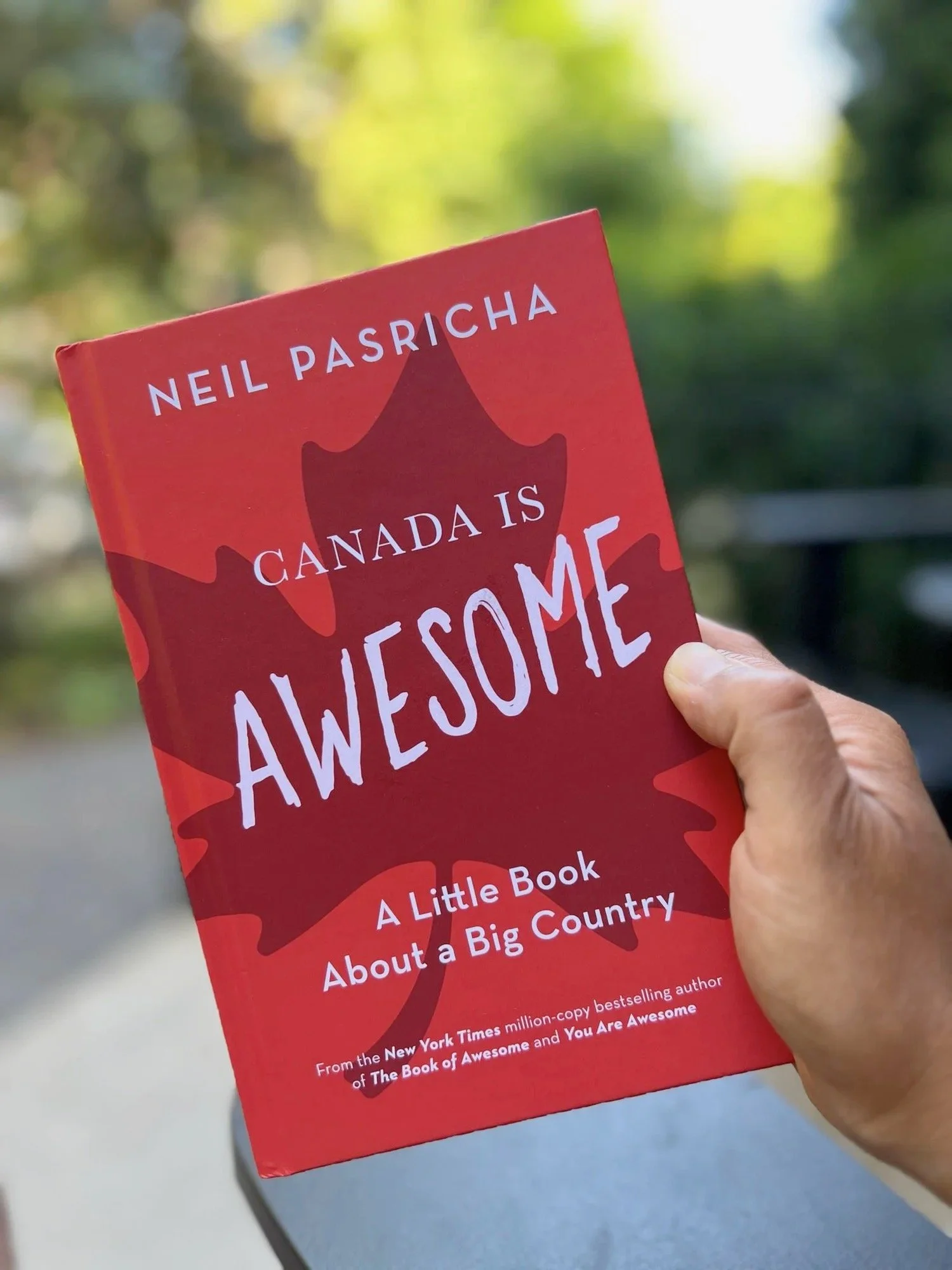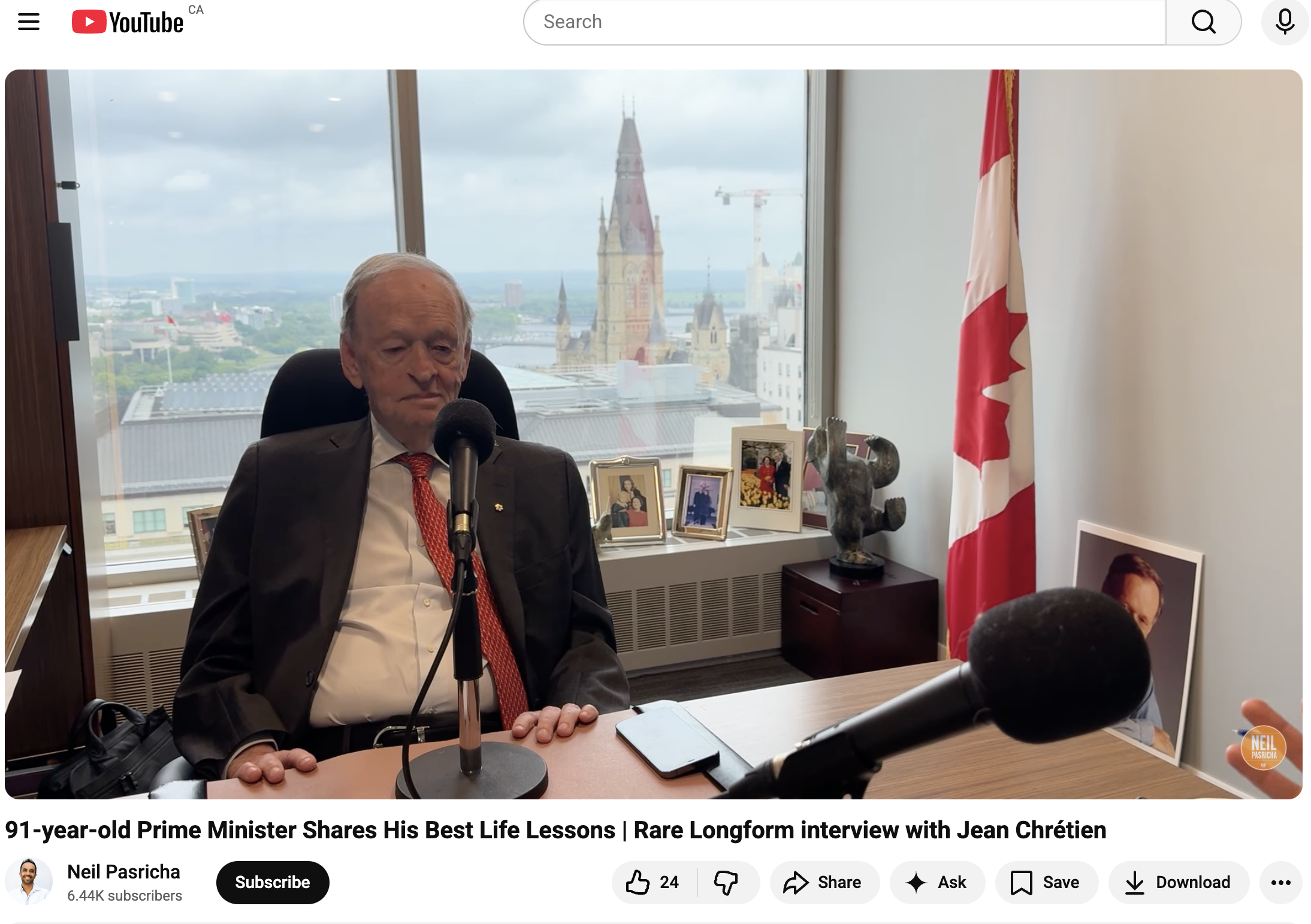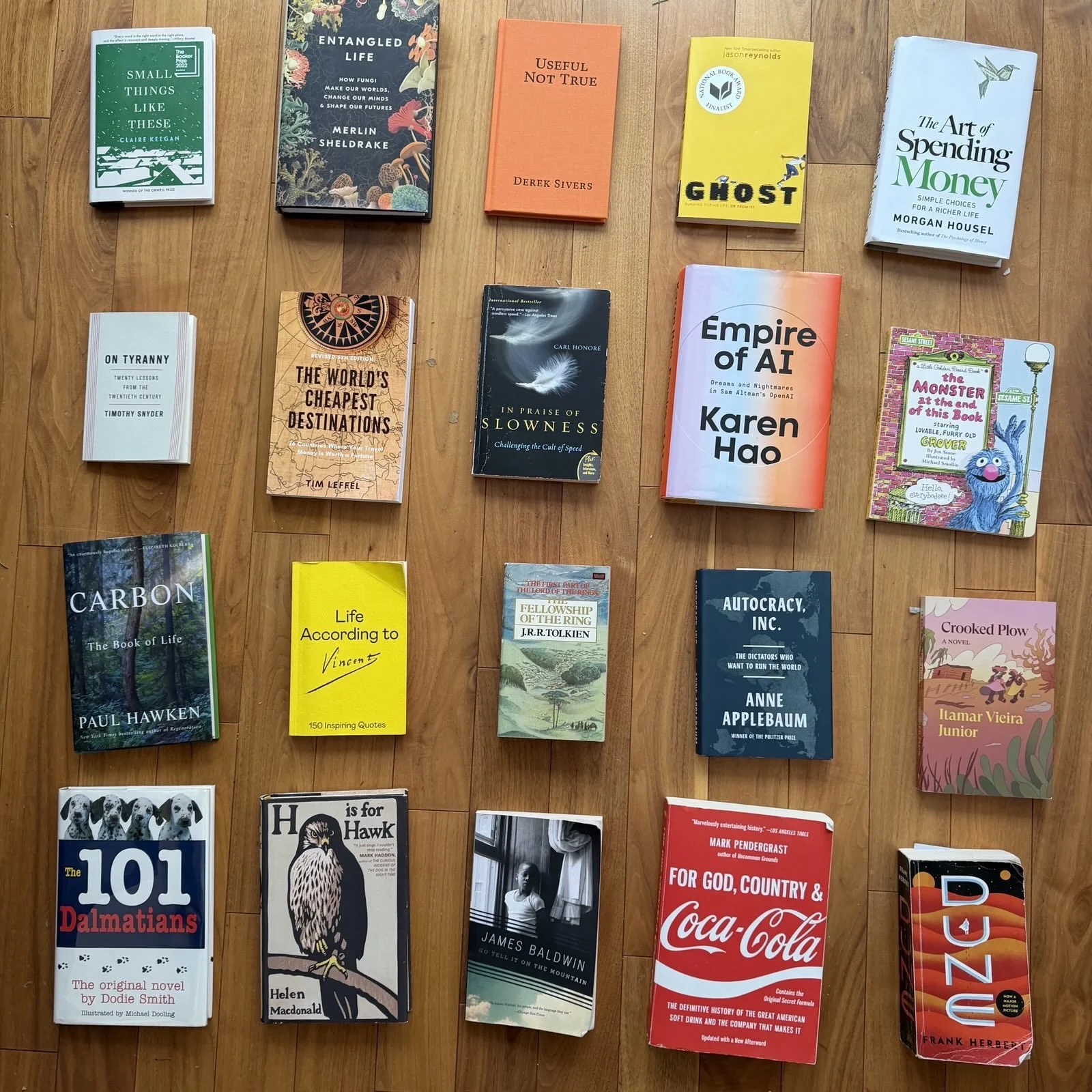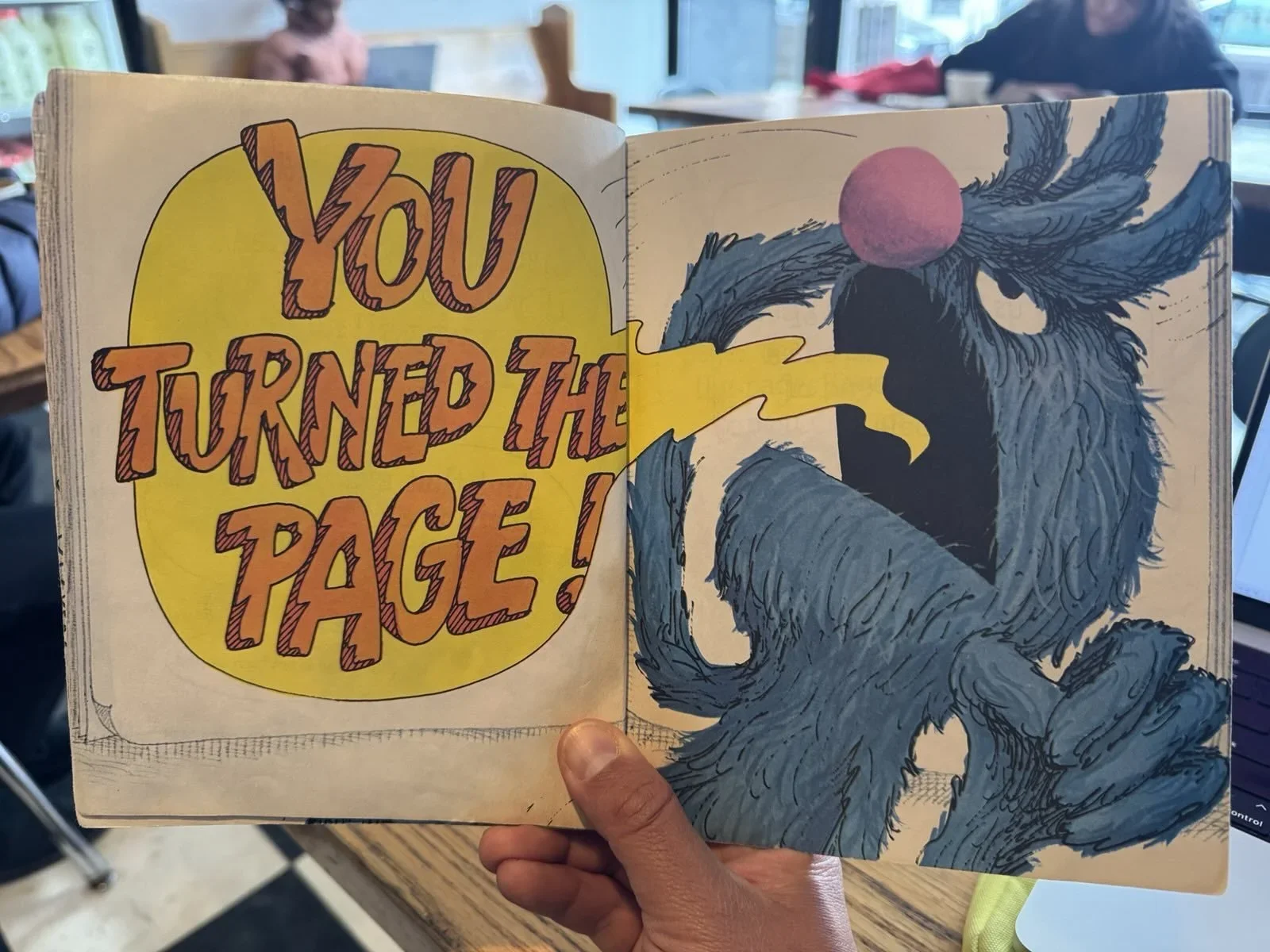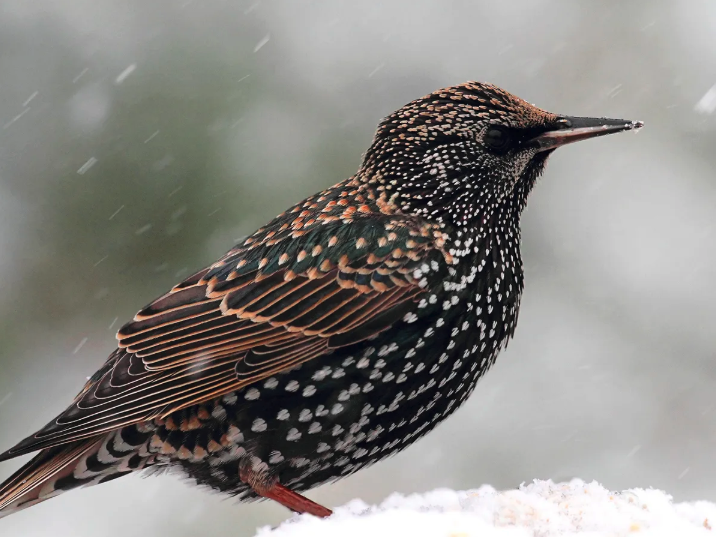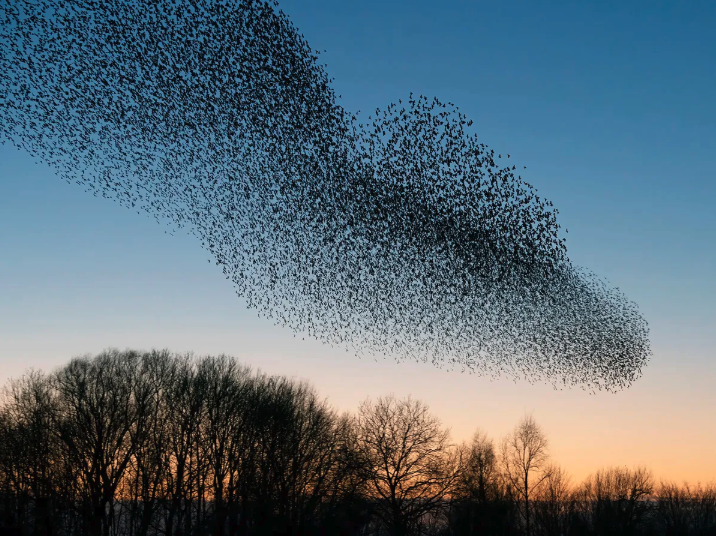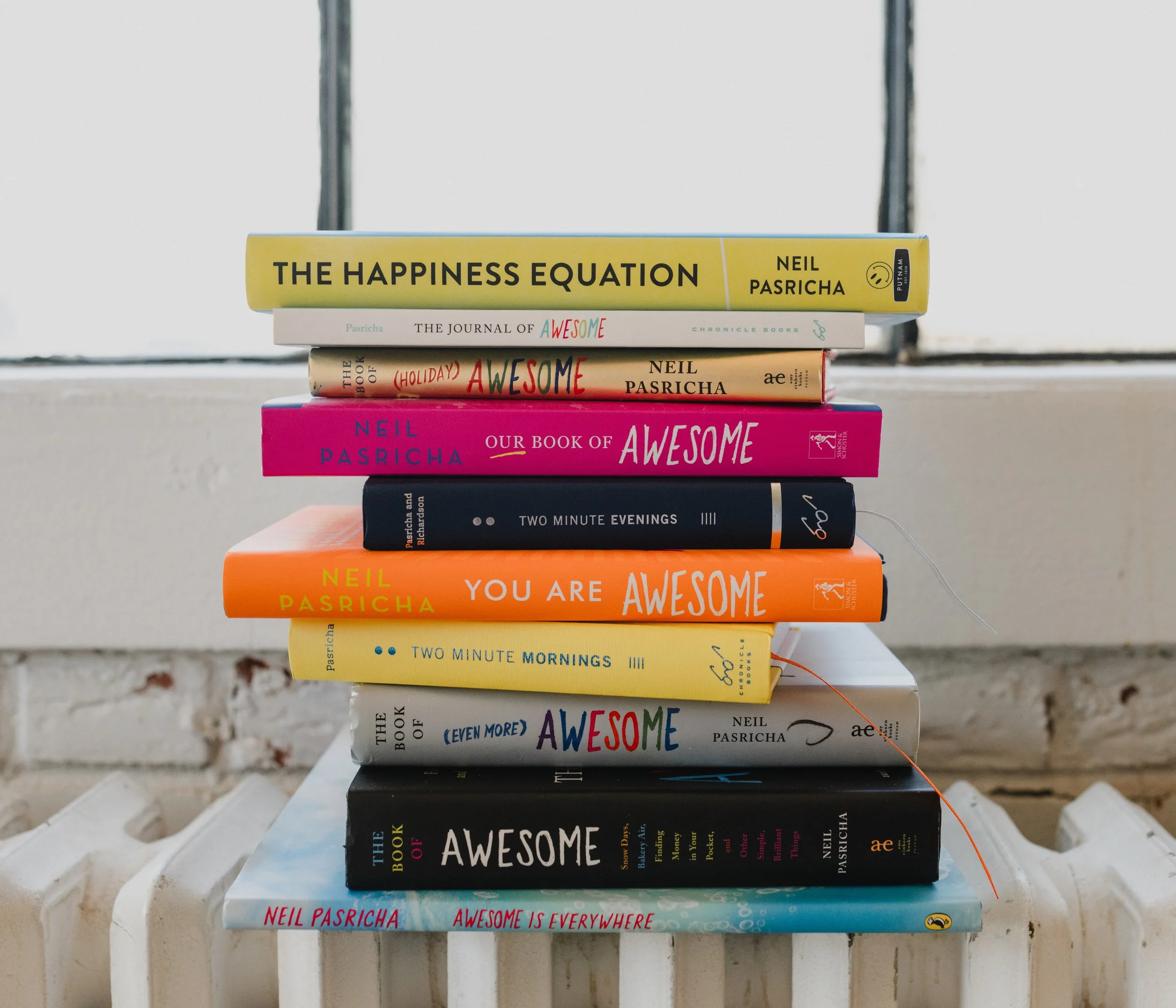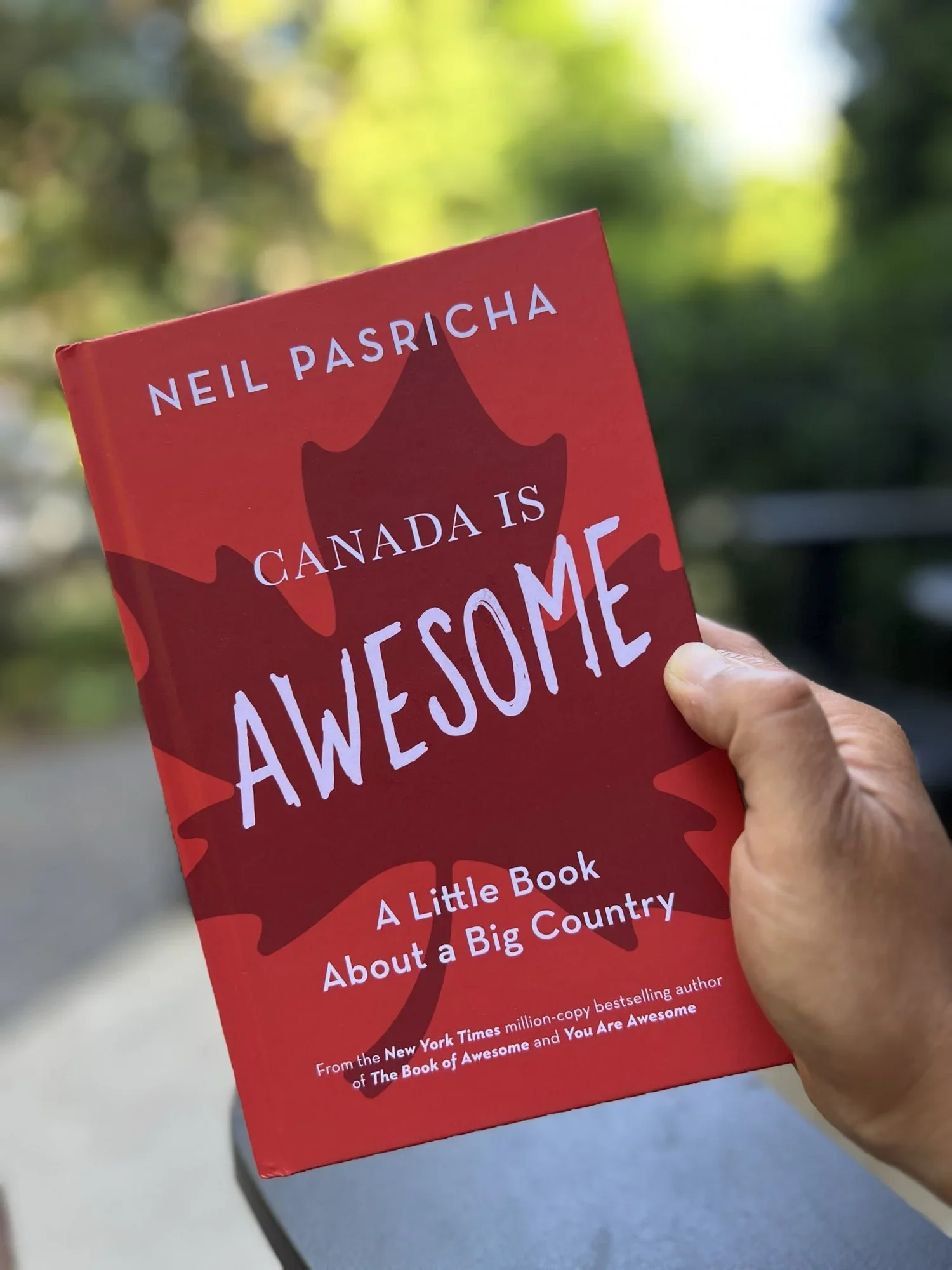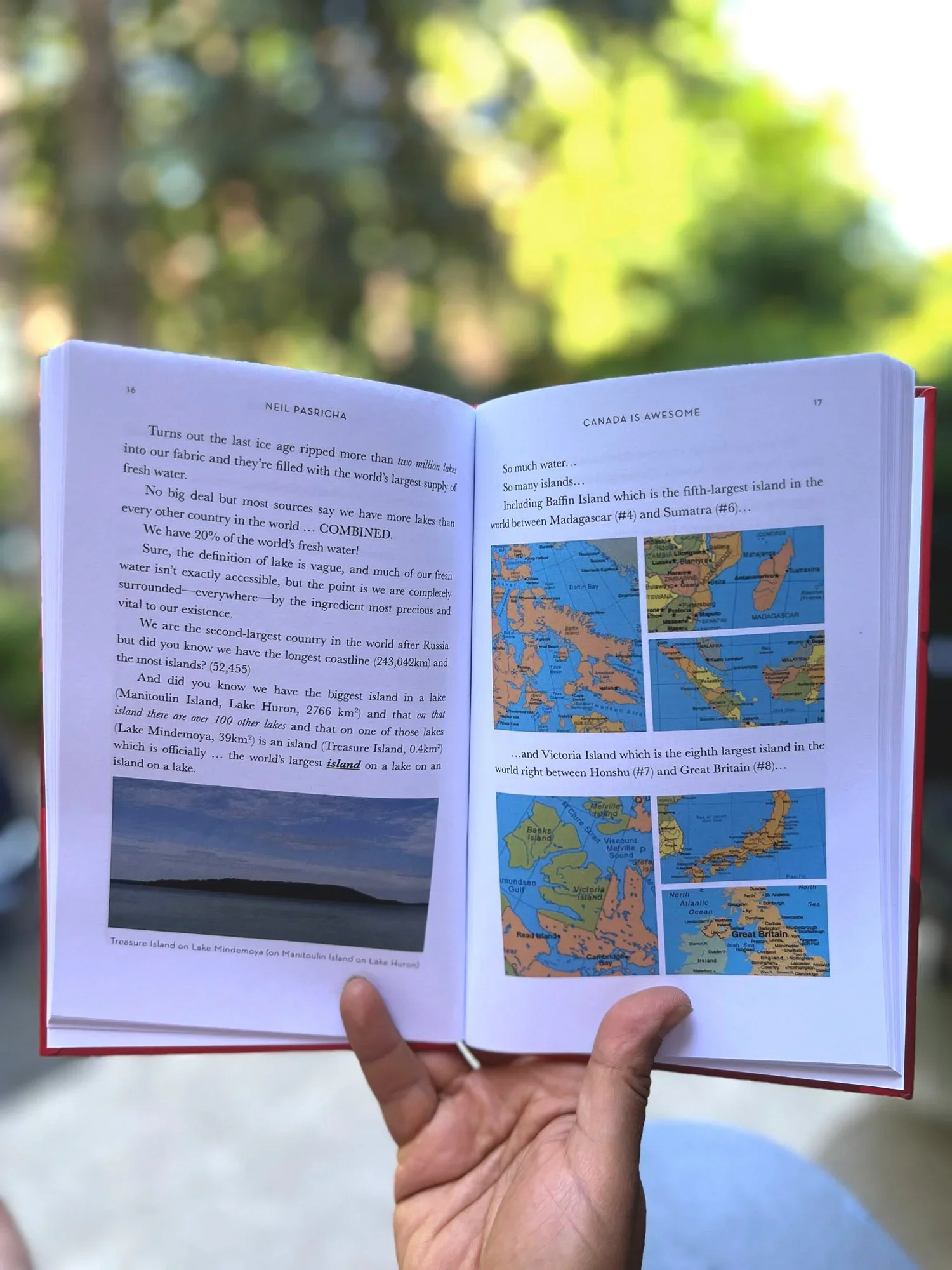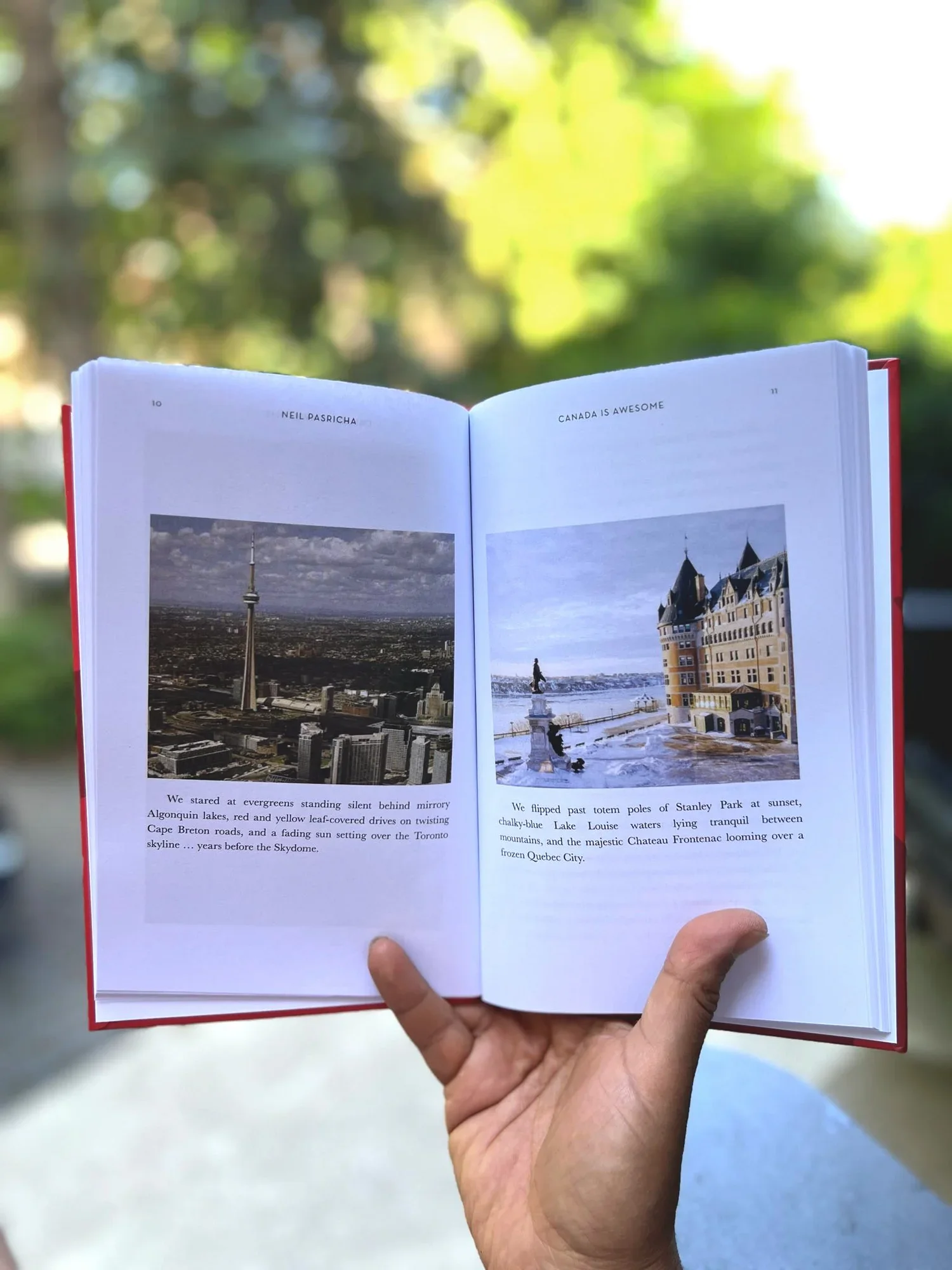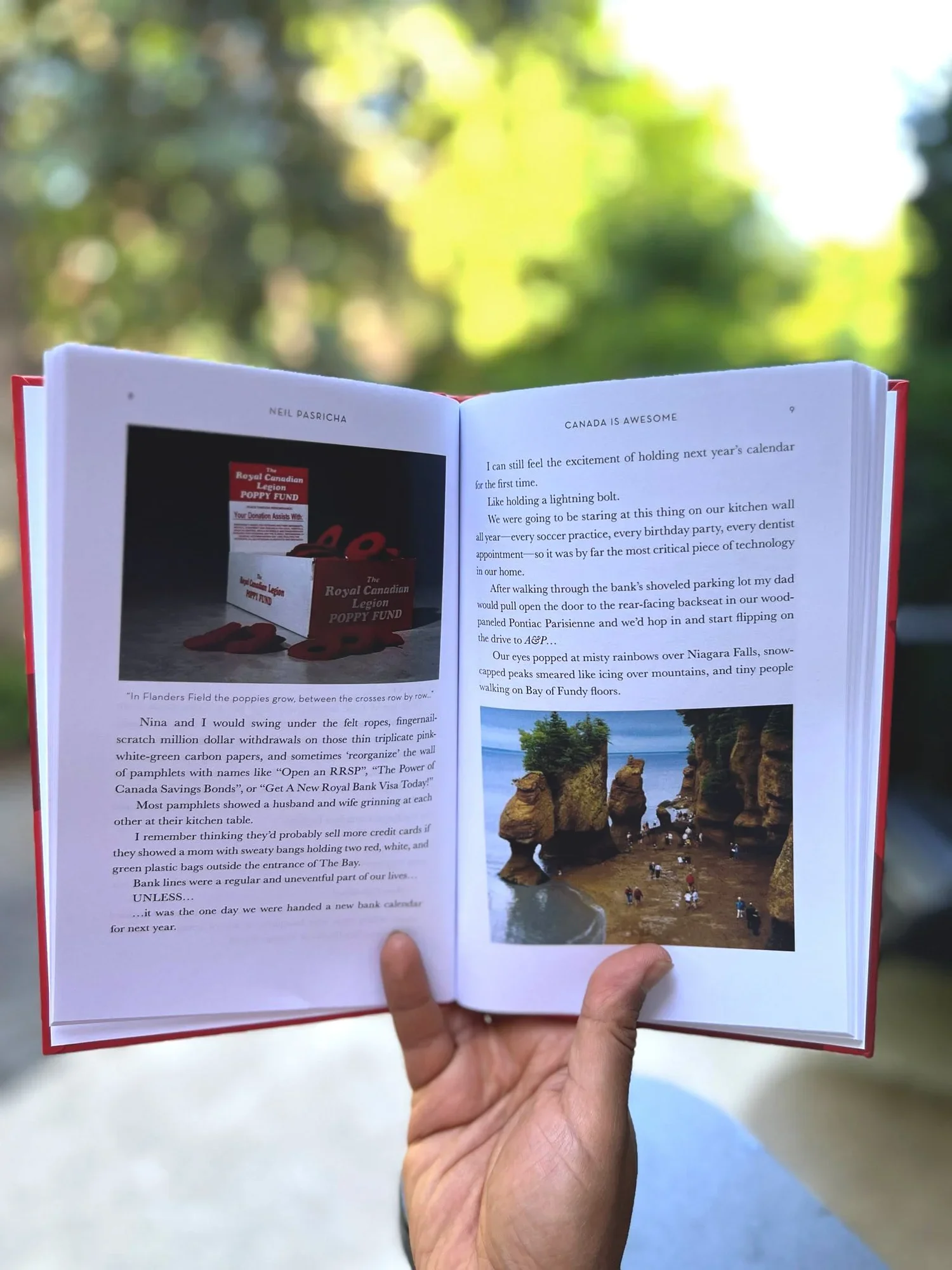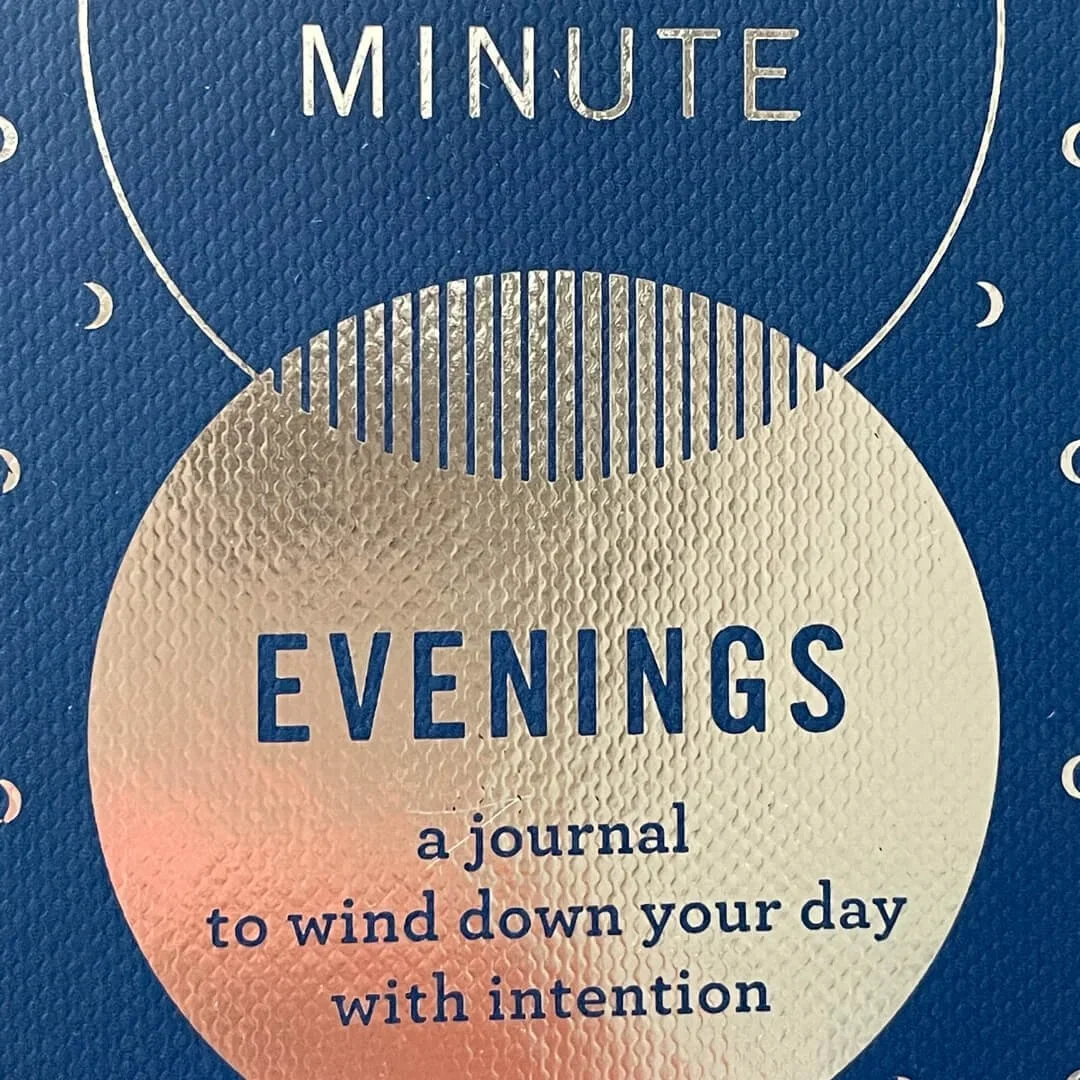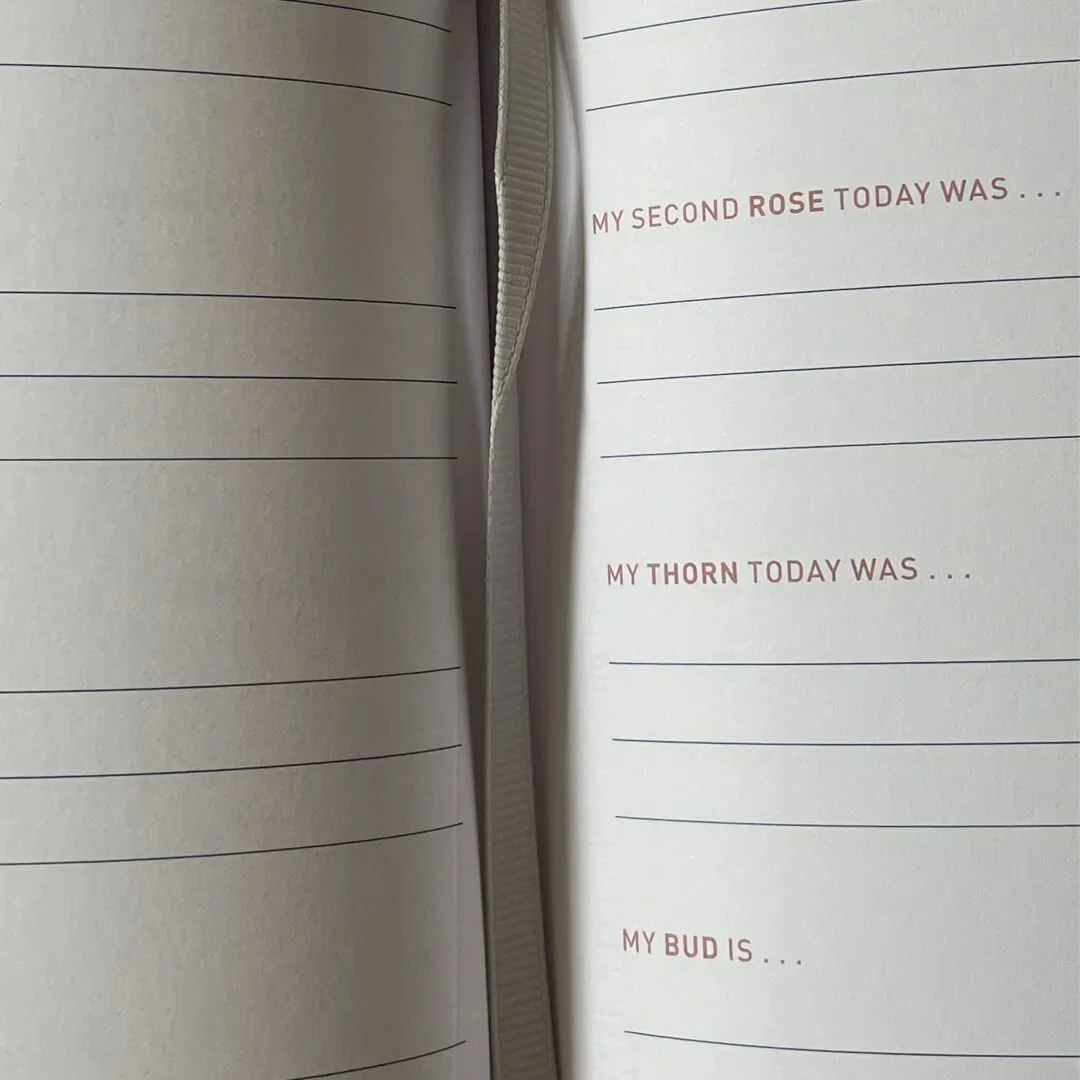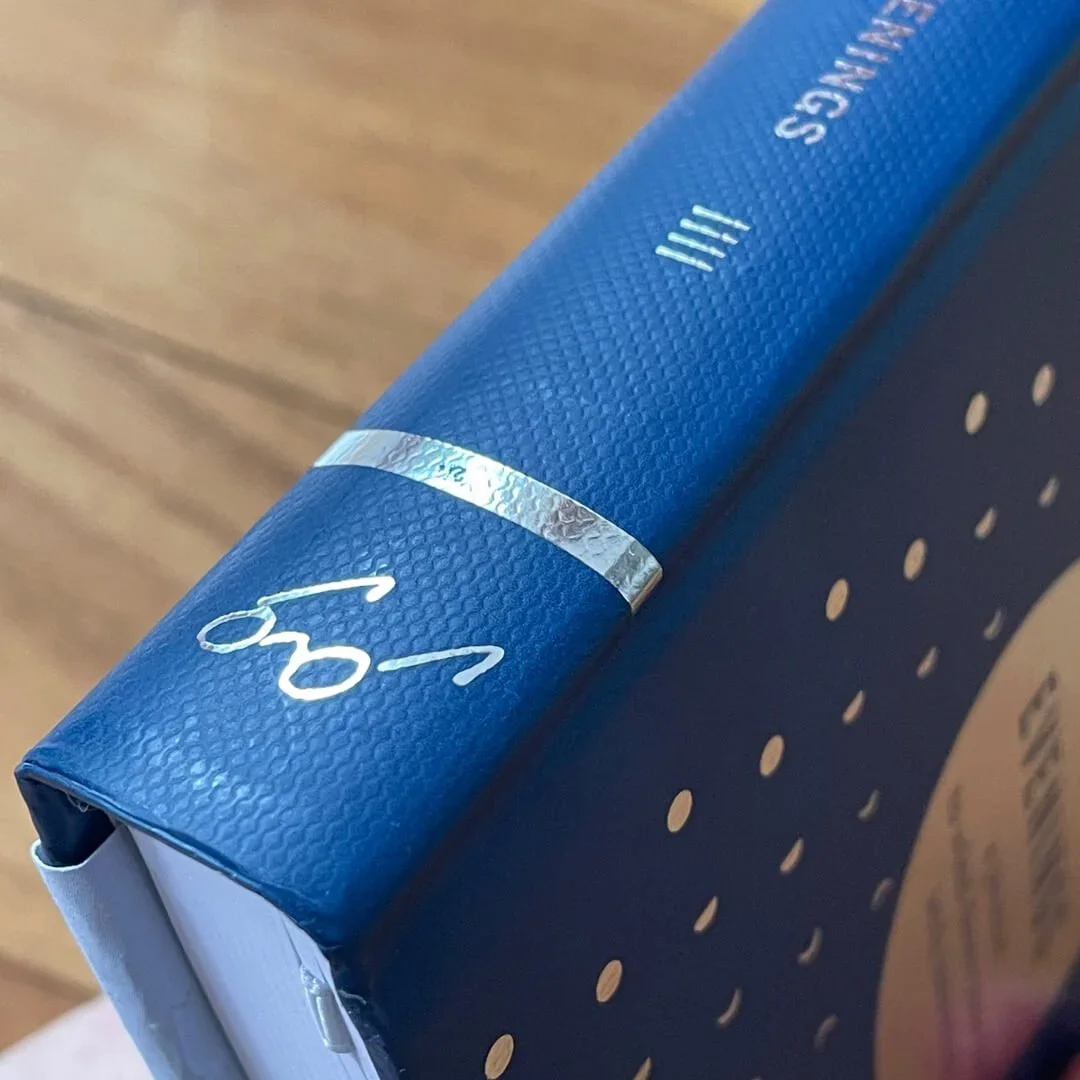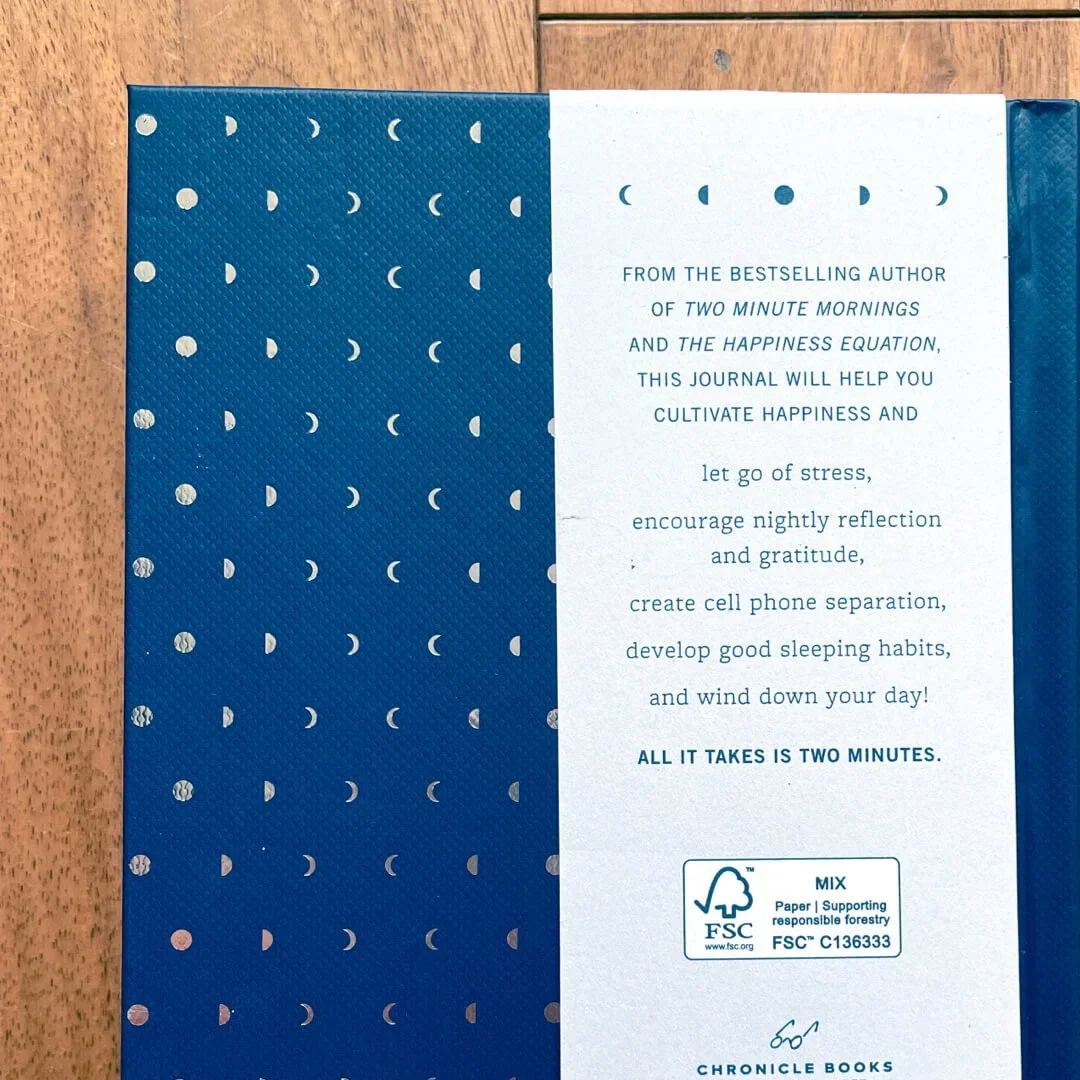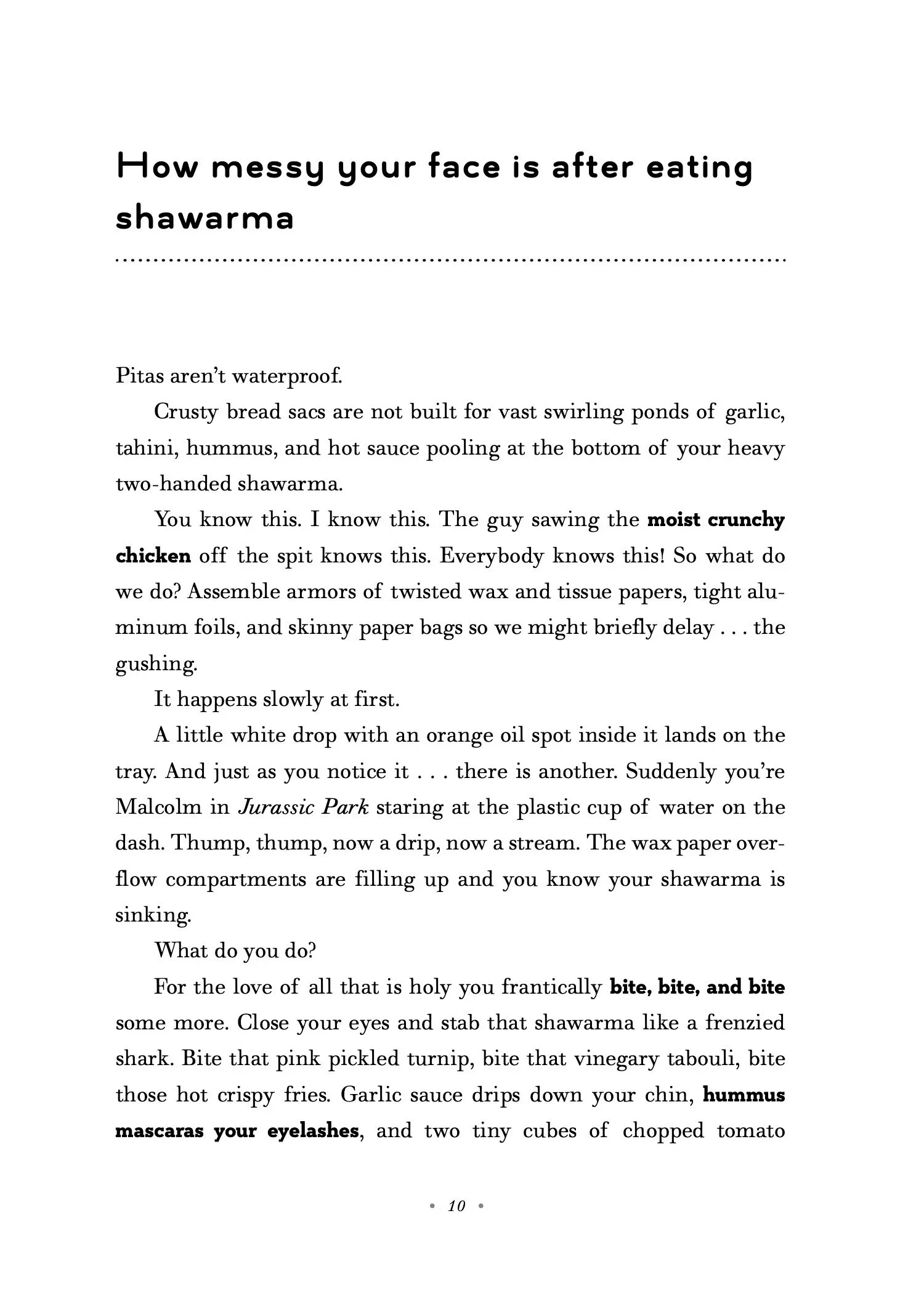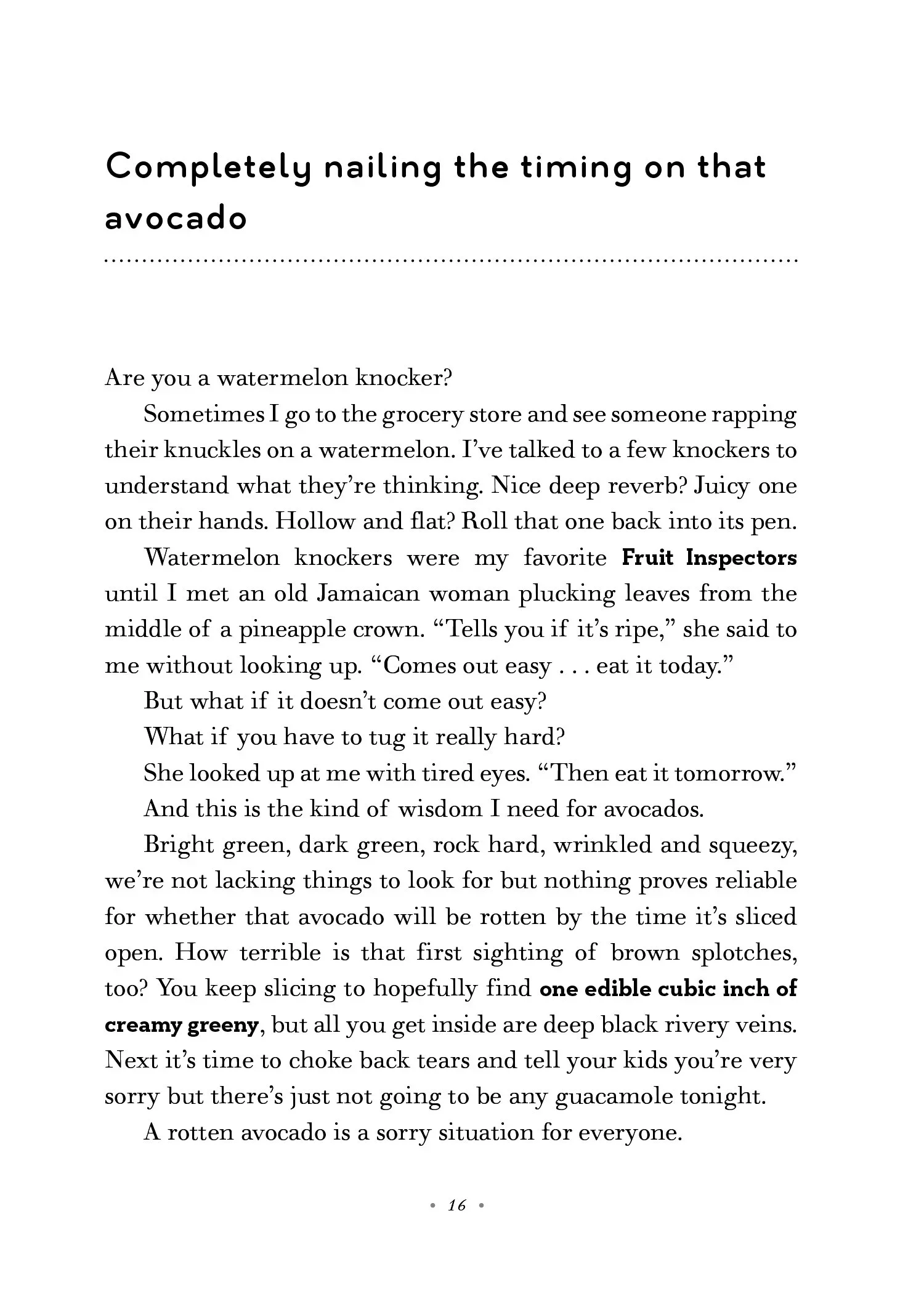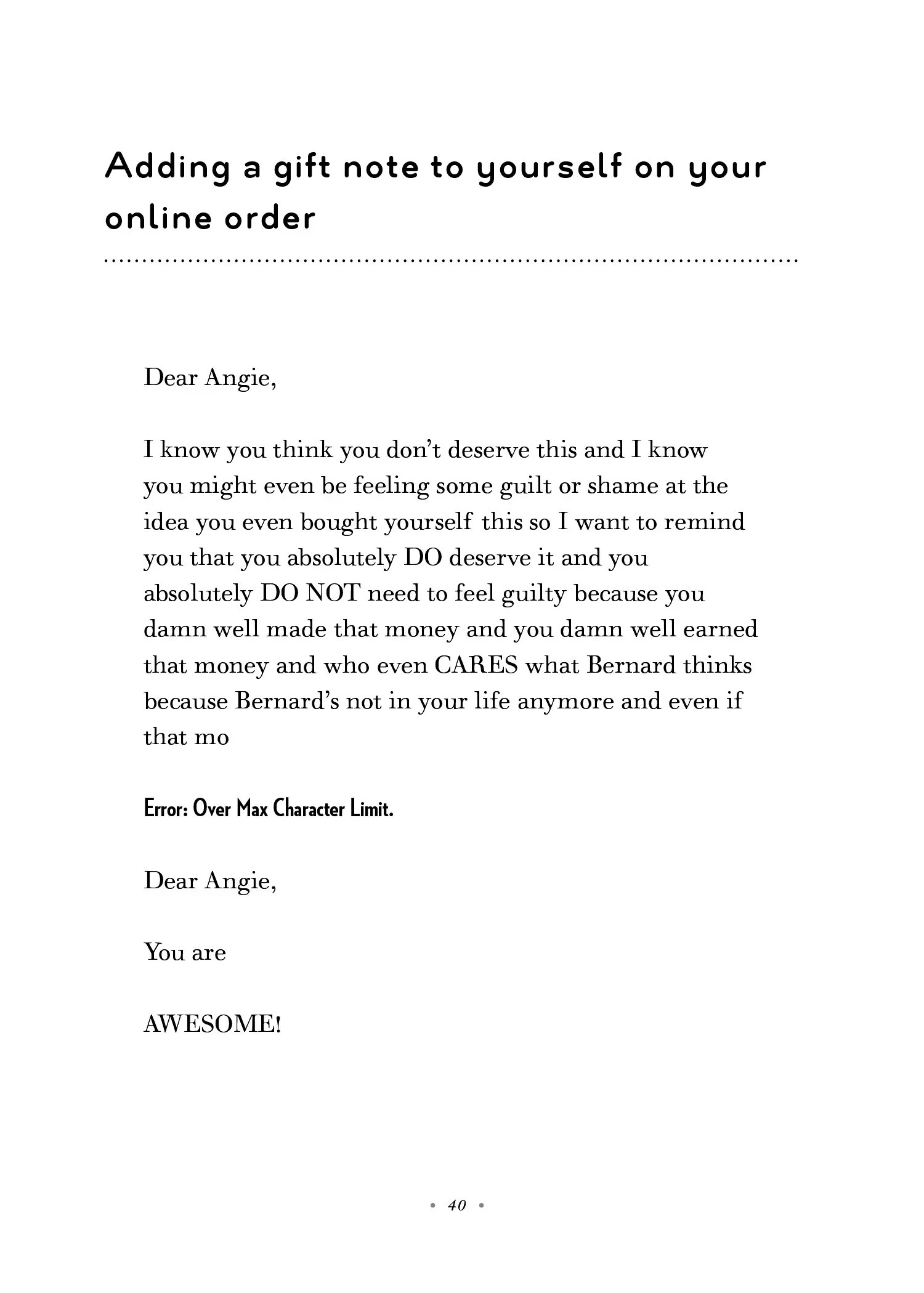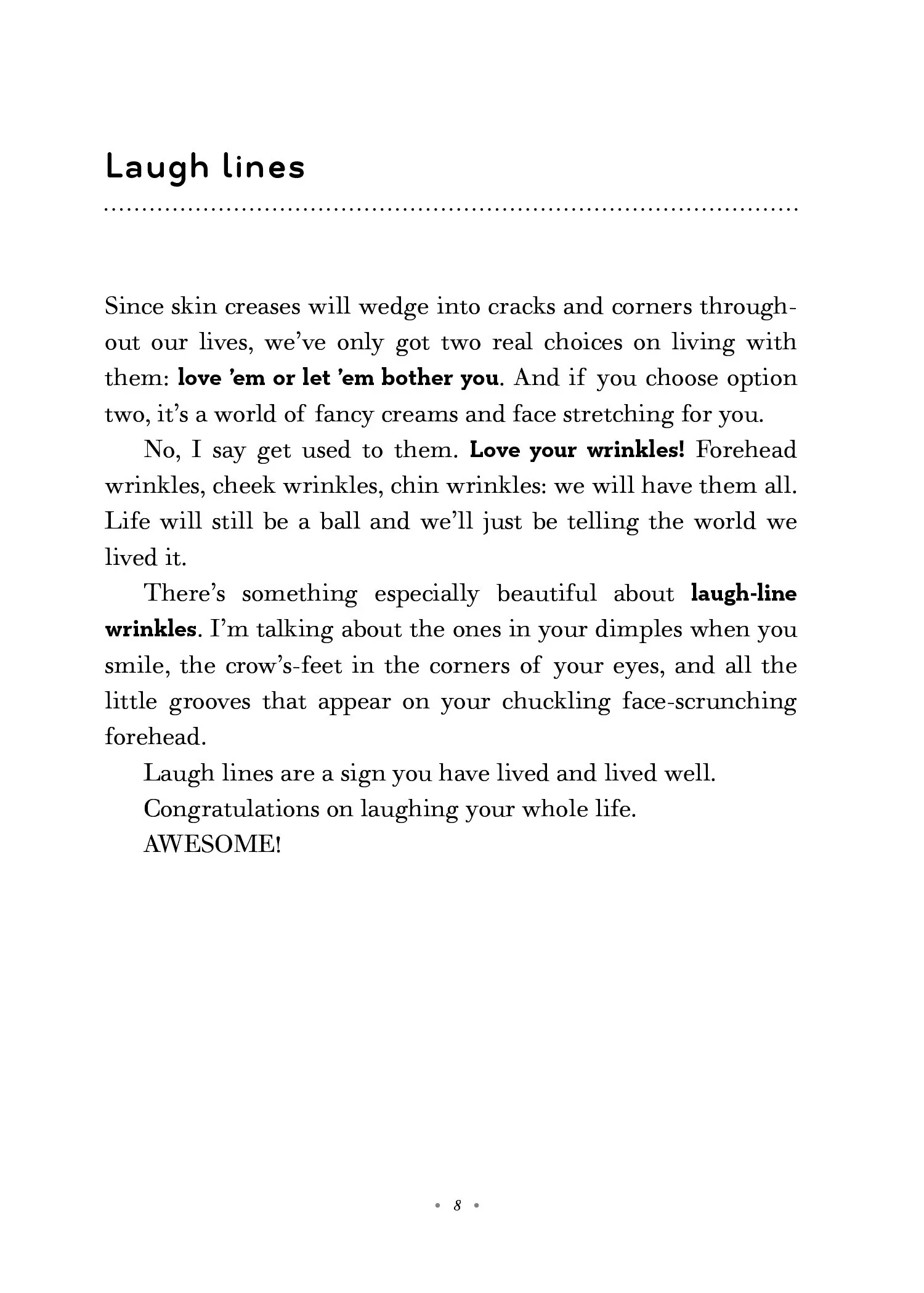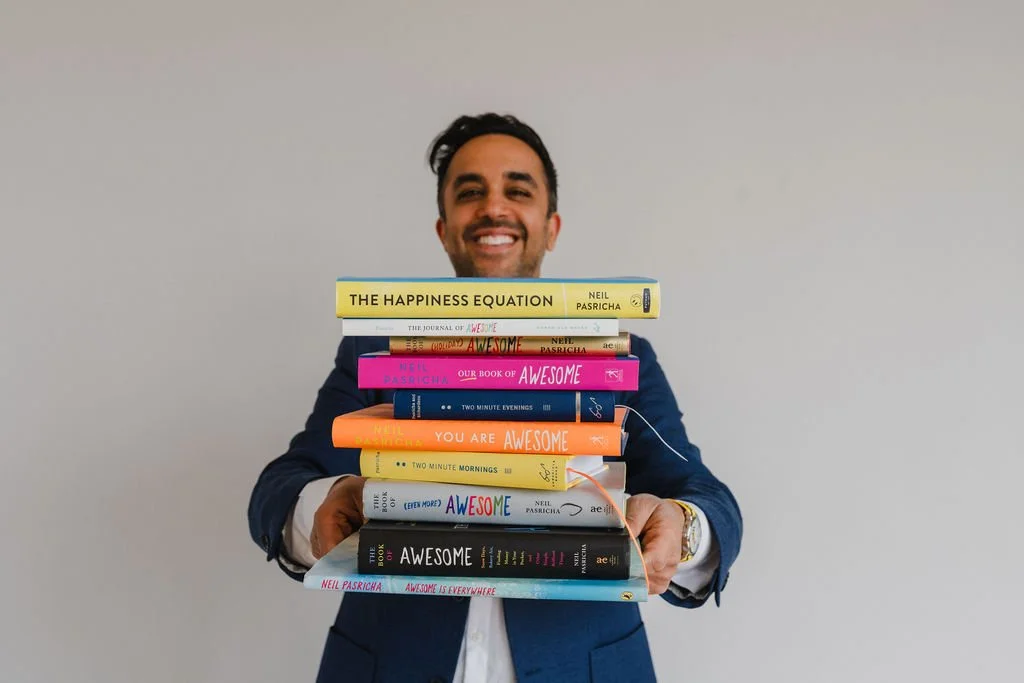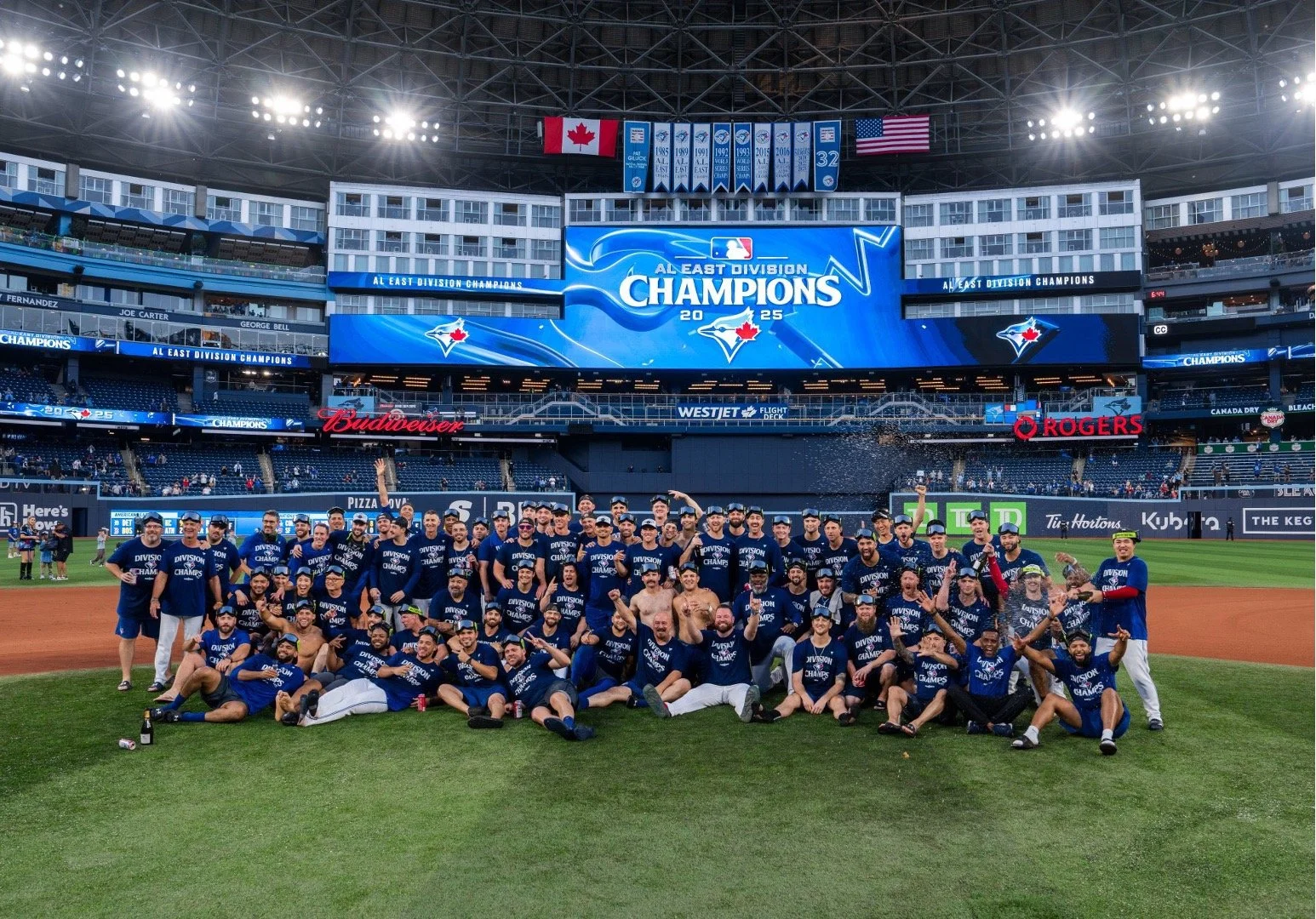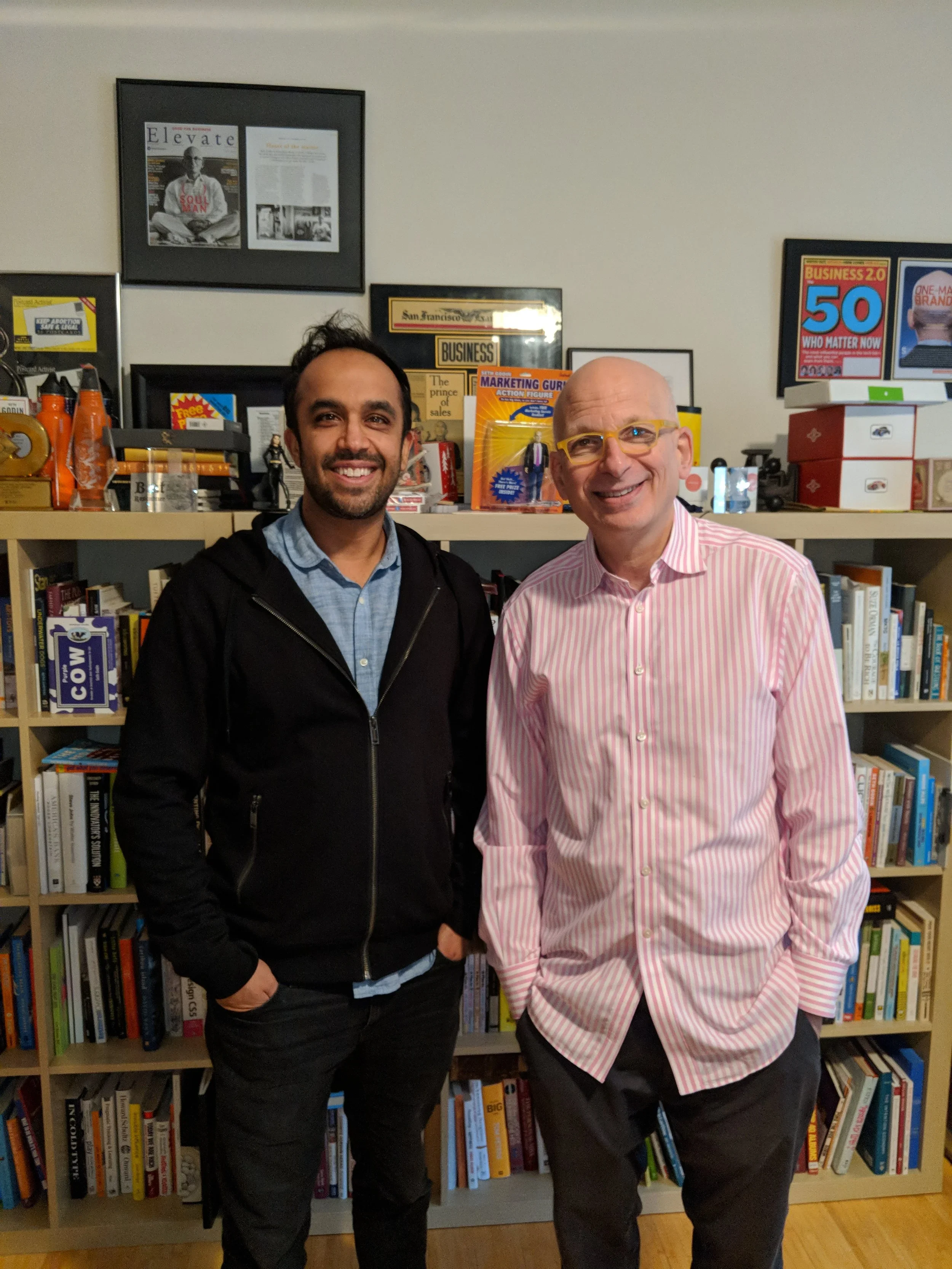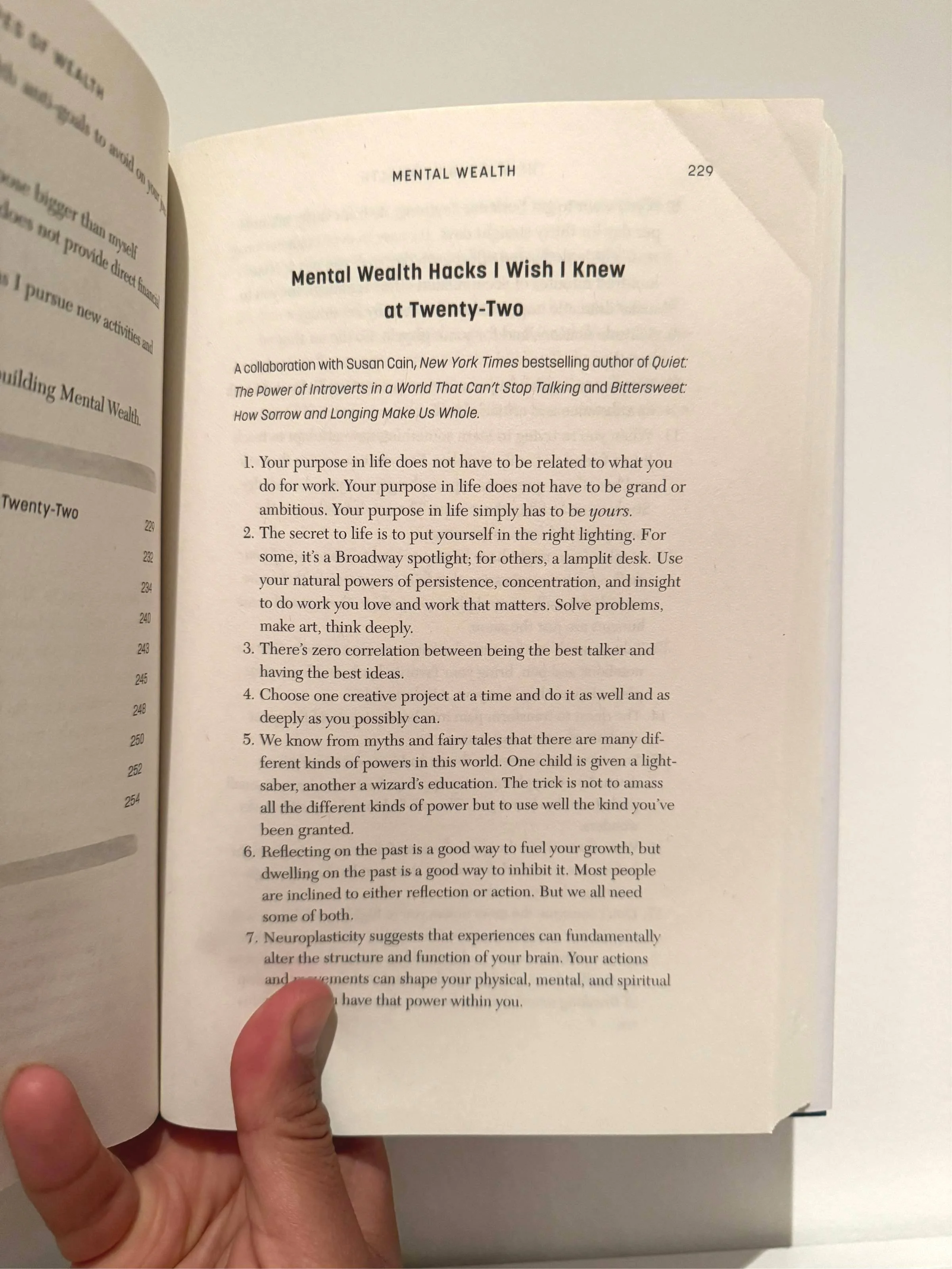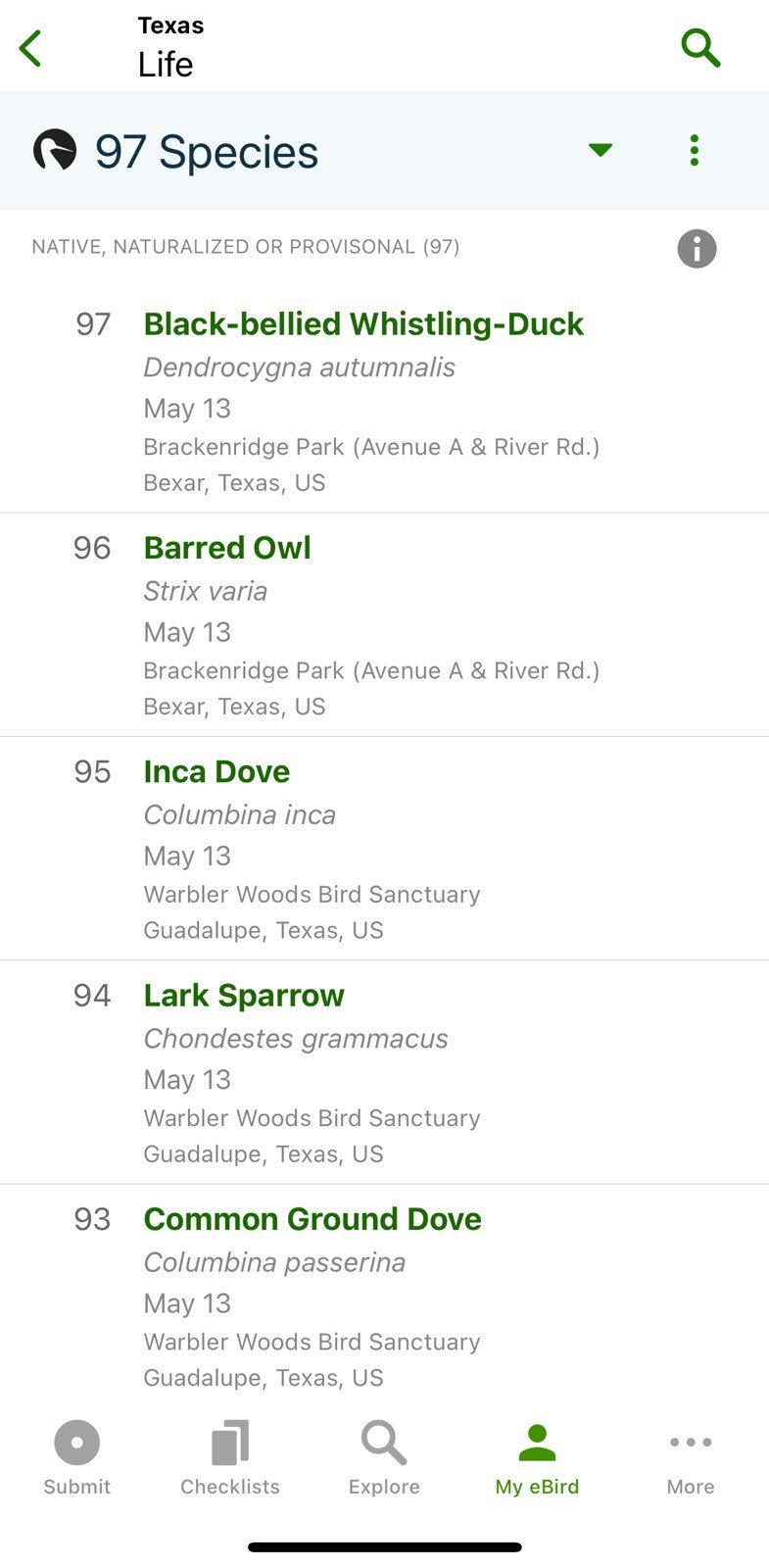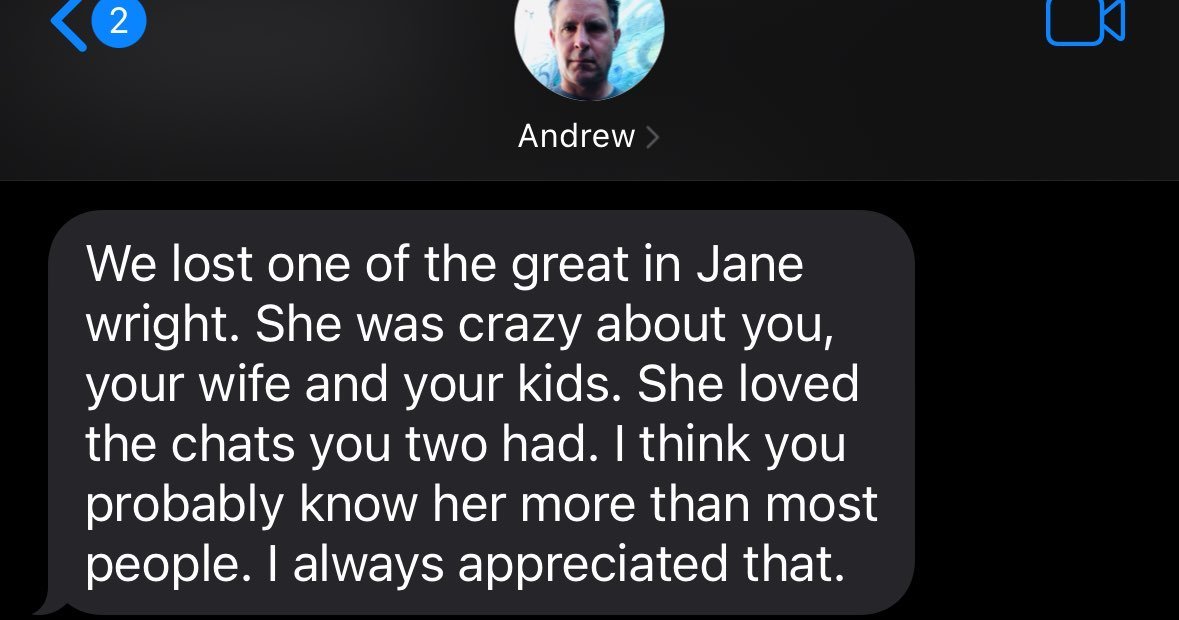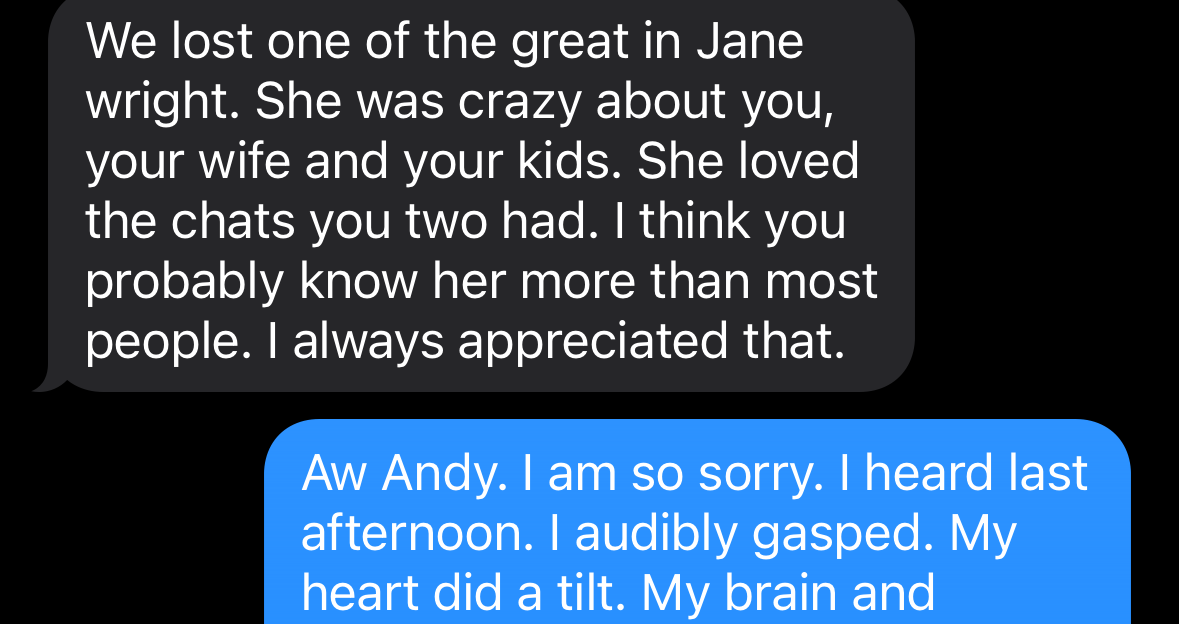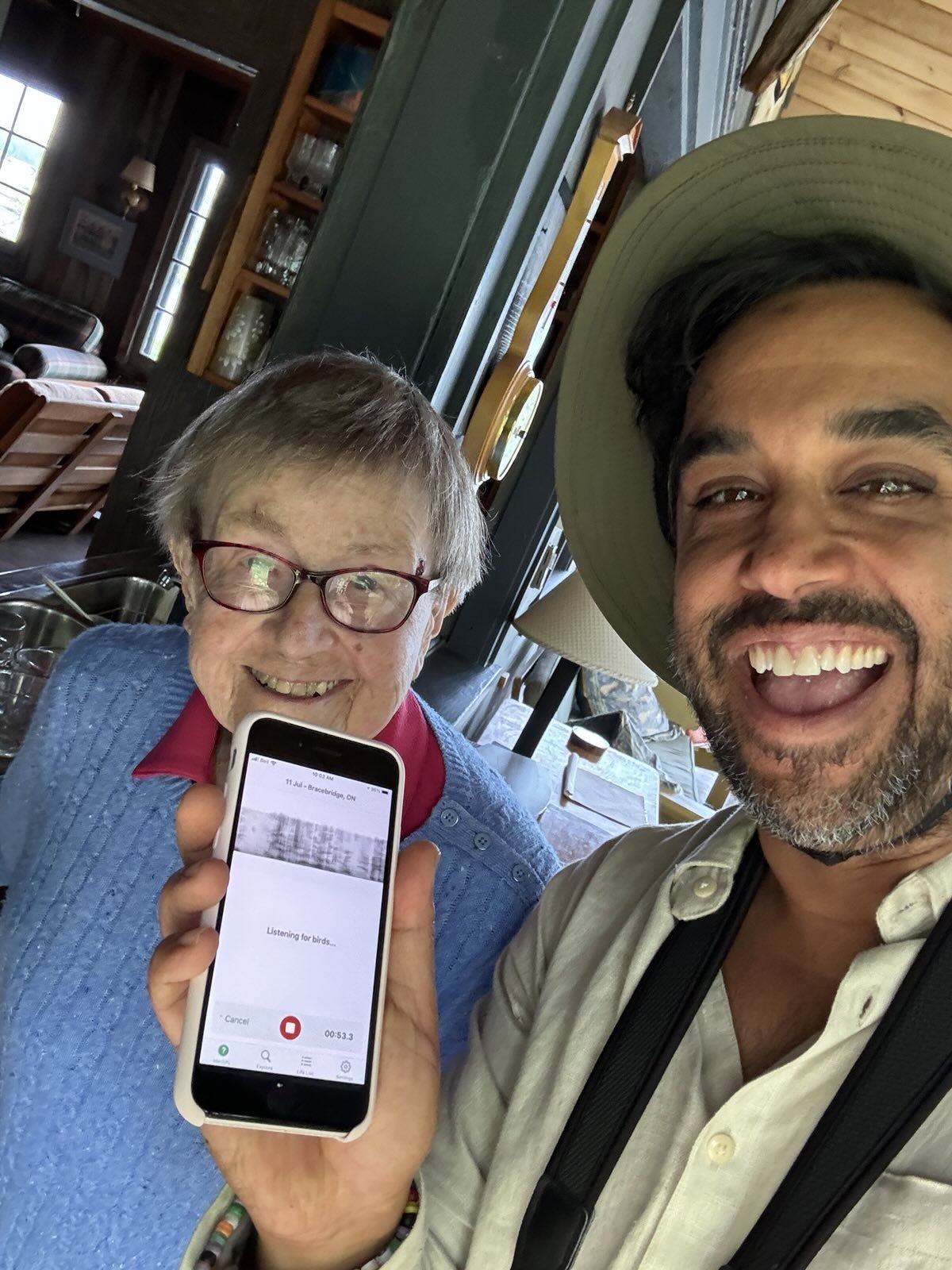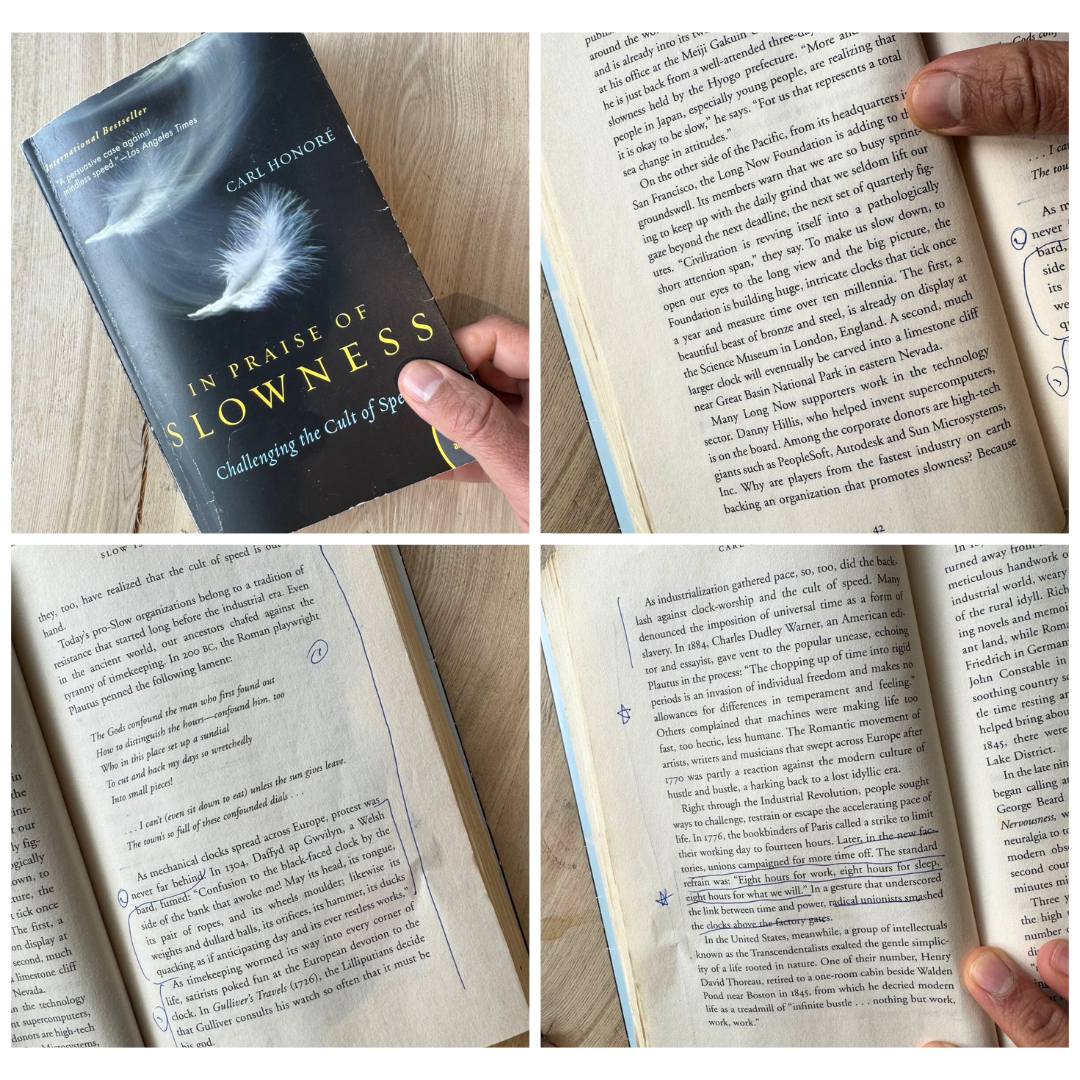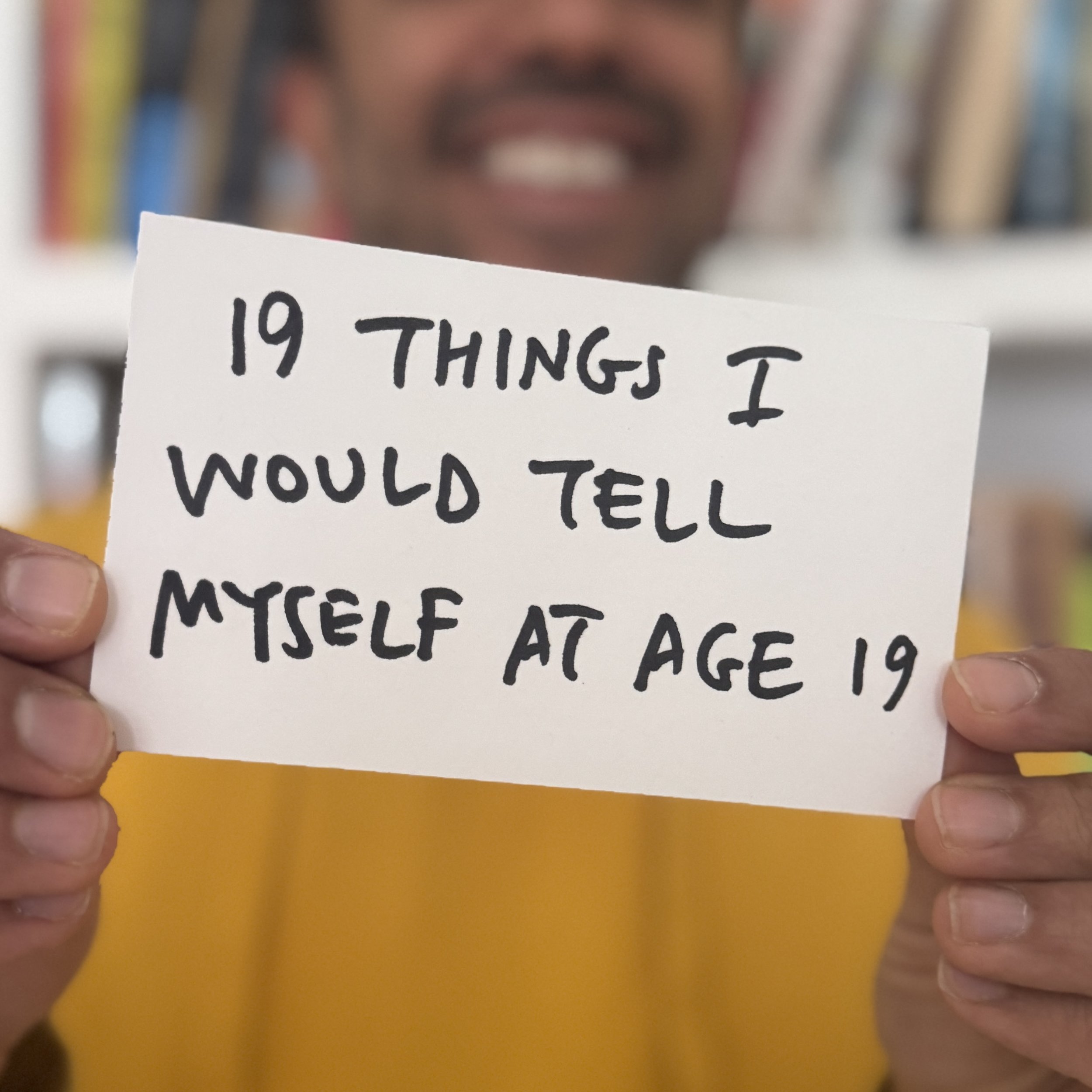Why Gratitude is a Leadership Superpower: My Interview with the Smith School of Business
Hey everyone,
Happy new year!
I was recently interviewed by the Smith School of Business (my alma mater!) about my thoughts on gratitude. I thought I'd share it with you below as a way to refresh some thoughts as we get into the new year.
Neil
Why Gratitude is a Leadership Superpower
Interview by Deborah Aarts
Neil Pasricha, BCom ’02, knows he has plenty to be thankful for. Yes, there’s the highlight-reel career stuff. He has 11 wildly popular books, including 2010’s smash The Book of Awesome, last year’s Our Book of Awesome and, most recently, Canada is Awesome—which have collectively sold more than two million copies and spent more than 200 weeks on bestseller lists. He also has a thriving speaking business that takes him around the world, firing up audiences to live happier, more fulfilling and more resilient professional and personal lives. And then there’s his podcast, which gets him talking to fascinating people (ranging from Seth Godin and Brené Brown to Temple Grandin and Quentin Tarantino) about the books that formed their sense of self.
Pasricha appreciates all of it. But in a phone interview on a sunny fall day, work accomplishments are not what first come to mind when asked what he’s grateful for. Instead, he shares a laundry list of tiny, beautiful wins that have lit up his day: That his seven-year-old woke him up with snuggles. That his wife is finally recovering from a concussion. That he has a square of dark chocolate waiting for him in his backpack. That he is able to have the conversation while going for a walk, which doubles his daily step count, and that the weather is fine enough to allow him to go jacket-free.
Taking note of little things like these might seem frivolous, but in Pasricha’s view, it’s anything but. That’s because he’s studied the science and therefore knows that people who make gratitude a regular, everyday practice are proven to be happier and healthier individuals. They’re also better leaders, prone to building more engaged, resilient and innovative teams.
Indeed, gratitude can be a competitive advantage, even in the cutthroat realm of commerce. That’s why—as Pasricha explains to Smith Business Insight contributor Deborah Aarts—it’s a practice leaders should actively cultivate.
Deborah Aarts: Let’s start by going back in time. What first got you into gratitude?
Neil Pasricha: It was 2008. I was going through the end of my first marriage, around the same time that my best friend—who had attempted suicide once before—ended up taking his own life. I was living in Mississauga, managing leadership development in Walmart’s HR department, and I remember driving home from work one day and thinking, “I need a way to focus on something positive.”
I had always liked to write, and I thought that might be a way in. So I got home, Googled 'how to start a blog' and, about 10 minutes later, set up a little website called 1000awesomethings.com and set a goal to writing about one awesome thing every weekday for 1,000 days.
In the beginning it wasn’t overly positive. I was writing about things like when the cashier opens a new checkout lane for you at the grocery store. But I tapped into something: How great it feels when a little moment of victory happens, even amidst a negative situation. That’s how I started. It’s been nearly 18 years and I still make a point to write one new awesome thing every single day.
Deborah Aarts: How has your understanding of gratitude changed since, as you’ve amassed more and more success?
Neil Pasricha: When the blog finished in 2012, I’d been doing it every day for four years. It had become far more popular than I ever expected and had led to three books. I kind of thought, “mission accomplished.”
But it turns out that you can’t really turn off gratitude once it’s a practice.
The reason is biological. We each have an amygdala in our brains—it’s the oldest part of the brain, preceding our species. It’s about the size of a walnut, and it secretes fight-or-flight hormones all day. The amygdala is a vital part of species survival: It’s why we look at the questions we got wrong when we get a math test back, why we seek out one-star reviews of the item we want to buy on Amazon. Instinctively, we are wired to seek out the negative.
I’ve learned that we really do have to battle this biological, root part of our psyche all the time. It really does have to be a daily practice. You can’t stop. You don’t ever get to a place of being “done” with gratitude.
Deborah Aarts: How does the practice of gratitude square with the world of business and the tendency to constantly seek new, better and bigger ways of doing things? Is gratitude always at odds with modern capitalism? Or can it be complementary?
Neil Pasricha: I don’t disagree that late-stage capitalism can have all kinds of negative externalities. We’re seeing wealth becoming extremely concentrated. We’re seeing so much of our ability to enjoy things become contingent on 10 different sign-ups, 12 different accounts and endless subscription fees. We’re seeing our streets filled with delivery vans. We’re seeing a lot of people whose default mode is “Go, go, go.”
We’re also all exposed to extremely sophisticated, billion-dollar research algorithms that are far smarter than we all are. It’s hard to scroll anything online without coming across anger-producing drips meant to make us upset. It’s happening at a rate that’s faster than what we can process and at a level that is beyond our understanding.
So yes, many parts of modern life make gratitude harder to practice than ever before, but I’d argue that we also have a greater need for it. Furthermore, gratitude is not something that slows you down or gets in the way of accomplishment. In my experience, it can only help you. Even in business.
Deborah Aarts: How so?
Neil Pasricha: Leaders right now have a very challenging set of circumstances. Markets are uncertain, which makes employment feel uncertain for a lot of people. Yet as a leader, your role is to inspire and motivate a team by setting a direction and helping support people towards their goals. You need a workforce that is engaged in their work, and trusting of one another, and that can be hard to create when things feel so uncertain.
But there are real benefits to be reaped if you can show up with positivity at work, even when things feel stressful and overwhelming.
We know from research that when you can help your employees feel grateful for both the work that they’re doing and for the team that they’re part of, the benefits are myriad. Engagement improves. Productivity goes up. People are more likely to feel that what they do is important. Trust goes up among teams, absenteeism goes down, and fewer people look for other jobs. This is all exactly what you want as a leader.
Deborah Aarts: So, is it the job of the leader to model appreciative behaviour?
Neil Pasricha: I think so. I worked at Walmart for 10 years and one of the projects I led was trying to understand how two similarly sized, structured and situated stores had such varying degrees of standards. One store had a completely clean parking lot. The floors were spotless. Everything on the shelves was tidy. The standards were really high. The other store often had garbage in the parking lot, gum on the carpet, shelves that were askew. We did an analysis. Guess what? At the first store, the store manager would often put the carts away, pick up garbage and straighten shelves as they walked by, so everybody else did too. At the other, the manager wouldn’t do those things, so no one else did.
Your work as a leader is observed, mimicked and reflected in the workforce at all times. So if you can be brave and say, “I want to start or finish a meeting with a gratitude exercise,” that behaviour gets reflected throughout the organization. And when people recognize and see one another and show gratitude towards each other, everything gets easier and better for the person leading them.
Deborah Aarts: What are some practices leaders can employ to stoke gratitude in their teams?
Neil Pasricha: One practice I like is to create a “Wall of Awesomes” in the office. You just leave a pile of cards or sticky notes and pens or markers beside it. Encourage people to write down something that they appreciate whenever they feel like it. Maybe they love it when there’s still hot water left in the kettle in the office kitchen. Or when they’re late to a meeting, but their boss is even later. It can and should be organic. But when people start writing things like that down, you end up having this physical manifestation of gratitude in the office atmosphere. It becomes impossible to walk by without seeing some positivity reflected at you.
You can also start a meeting with “Rose, Thorn, Bud,” which is a classic gratitude practice in which people share a success, a challenge and something with potential. As the person leading the meeting, you can stress that there’s no pressure to play, and then start by doing it yourself. It’s not easy. In fact, it can be a bit awkward at first. But if you do that at the beginning, the tenor and the tone of a meeting changes. People become more naturally open, more willing to share, more likely to trust and lean into each other.
Another way is to end a meeting with a round of appreciation. Encourage anybody who feels comfortable doing so to say a thank you to anyone else on the team for something they’ve done. Again, as a leader, you can start, or you can sit in a nice 30-second pause and let it kind of bubble up. The combination of gratitude and recognition can reduce a lot of workplace challenges and open up peoples’ ability to feel more seen and human at work.
Again, it’s not always easy. These little games and activities take courage to initiate. But they do make people feel seen, and they do help our brains to be more positive when it’s not our natural default position.
Deborah Aarts: Can you share a tip to help leaders integrate more gratitude into their own busy lives?
Neil Pasricha: Here’s a simple one: Try to write down tiny and specific things you’re thankful for every day. Not the big things that come to mind first, like your husband, or your kid, or your dog. Instead, something like, for example, that your husband, Antonio, put the toilet seat down, or that your daughter rode her bike without training wheels. Noticing small and specific things lights up area 17 of your visual cortex and creates a specific memory. When you write it down, it lights up area 17 again. And when you read it later, it lights up a third time. Simply writing down small, specific things you appreciate can have a doubling and tripling effect on the positive moments of your day.
Deborah Aarts: As someone who’s now been practicing gratitude for the better part of two decades: Does it get easier with time?
Neil Pasricha: In my experience, yes. Gratitude becomes a bit like a large sun in your mental solar system. I have days that I’m unhappy, that’s for sure. But if you actively seek out things to be grateful for, it becomes easier to find them. And the more you look, the more you see.
I talk about gratitude a lot! Here is some more detail on gratitude and a few 1000 things to be grateful for.
The Very Best Books I Read in 2025
Hey everyone,
Here are The Very Best Books I Read In 2025.
(And here are my Best Of 2024, 2023, 2022, 2021, 2020, 2019, 2018, and 2017, too.)
I don’t collect kickbacks on any links. Buy from your local indie (US/CAN/UK) or wherever you like!
Sending you energy, empathy, and some loving reading friendship in the run-up to the holidays...
Neil
20. Small Things Like These by Claire Keegan (b.1968). Crisp, poetic 119-page 2022 Booker shortlisted book following Keegan's 2010 stunner ‘Foster’ (BO2023) which takes a slow pan of a couple wintry months in New Ross, Ireland in 1985 through the eyes of local upstanding businessman, Bill Furlong, as he wrestles with what he discovers up on the hill.
First sentence: “In October there were yellow trees.”
Perfect for: book clubs who need a break from thick books, people looking for a gift for the English teacher, and historically oriented folks seeking to learn about the Magdalene laundries...
19. Entangled Life: How Fungi Make Our Worlds, Change Our Minds, & Shape Our Futures by Merlin Sheldrake (b. 1987). Do you ... take statins? Drink alcohol? Eat truffles? Take antibiotics? Just a few of the hundreds of ways our lives revolve around fungi—and seemingly always have. This book shrinks our lives into the wider and vaster world. Big in scope, endlessly stimulating, and arranged in an organic, haphazard, expanding-underground-network type of way this is a weird, wonderful, impossible-to-forget look at the much bigger things outside ourselves.
First sentence: "Fungi are everywhere but they are easy to miss."
Perfect for: science nerds, people curious about psilocybin/magic mushrooms, fans of the podcast Ologies by Alie Ward...
18. Useful Not True by Derek Sivers (b.1969). Slim self-published 88-page hardcover which says: We make stuff up! That’s how we live. We adopt beliefs, tell ourselves stories, create realities that aren’t true—but ... they help us navigate. So in conclusion we may as well make up things that help us.
First sentence: “This book is about reframing—changing how you think about something—and choosing a perspective that's useful to you right now, whether or not it's universally true."
Perfect for: people who feel stuck chasing a dream, fans of Paul Graham's essays, entrepreneur-minded types…
17. Ghost by Jason Reynolds (b.1983). A 180-page, 14-point-font book you will feel, love, learn from, and fly through. Confusing title! Ghost? That's the self-anointed nom-de-plume of Castle Cranshaw, a poor seventh grade kid who accidentally joins a local track team, then finds himself addressing his own trauma and anger on a new emotional plane. Jason Reynolds is a magician. Perfect storytelling, memorable characters—it'll have you feeling like you can run the 100 meters in under 10 seconds by the end.
First sentence: "Check this out."
Perfect for: anyone needing a Young Adult (YA) speed booster, people looking to read a book out loud with their 10-year-old, or fans of running or track and field…
16. The Art of Spending Money: Simple Choices for a Richer Life by Morgan Housel (b.1988). The majority of lessons here aren't income-specific. And Morgan reminds us in general that if you’re reading a book about money there’s a chance you have the bug. So this is for people who have the bug—or at least some of it. But this isn't clean advice, clear to-dos, or a bulleted list of 7 habits. It's a powerful Wisdom book—slipping into that non-existent bookstore category somewhere between Self-Help and Business. Wonderful collection of stories and insights to provoke, shift, and expand your thinking about how to maximize the quality of your life through the quality of your financial decisions. A truly incredible book.
First sentence: "Dr. Dan Goodman once performed LASIK eye surgery on a woman looking to ditch her glasses."
Perfect for: anyone who wants to get more intentional about their spending, people who like business storytelling, and fans of Warren Buffet's shareholders letters...
15. On Tyranny: Twenty Lessons from the Twentieth Century by Timothy Snyder (b. 1969). A thin 126-page manifesto-as-listicle from professor Timothy Snyder (formerly of Yale and now at The University of Toronto) which distills twentieth-century history into simple lessons to help navigate today’s era. In #2 “Defend Institutions” he writes, “The mistake is to assume that rules who came to power through institutions cannot change or destroy those very institutions—even when that is exactly what they have announced that they will do.” In #7 “Be reflective if you must be armed” he writes, “If you carry a weapon in public service, may God bless you and keep you. But know that evils of the past involved policemen and soldiers finding themselves, one day, doing irregular things. Be ready to say no.” From #12 “Make eye contact and small talk” to #14 “Establish a private life” to #15 “Contribute to good causes” to #20 “Be as courageous as you can” he shines light through a dark vision of today’s world.
First sentence: "History does not repeat, but it does instruct."
Perfect for: fans of ‘1984’ by George Orwell, those looking to lead peaceful lives amidst great churn, community leaders, local builders, and politicians...
14. The World’s Cheapest Destination: 26 Countries Where Your Travel Money Is Worth A Fortune by Tim Leffel (b. 1964). Tim writes the 22-year-running (!) ‘Cheapest Destinations’ blog and in this book we have his well-written travel guides to 26 countries you maybe haven’t thought about visiting. Kyrgyzstan, Albania, Laos, oh my! He shows how to avoid the cultural homogenization amidst Starbucks-overrun hotspots and how to do so safely and cheaply. Each 8-10 page country writeup has an overview that feels like you’re talking to a friend over a beer and then splits into sub-categories like “Transportation”, “Accommodation”, “Food&Drink”, and “What Else.” This book pays for itself again and again.
First sentence: "It's not how you go, but where!"
Perfect for: people who feel like traveling is expensive, people who want to get out of dodge without breaking the bank, anybody needing support before going to places they have heard are "dangerous"...
13. In Praise of Slowness: Challenging the Cult of Speed by Carl Honoré (b. 1976). Endless scrolling was invented twenty years ago, TikTok ten years ago, and AI images of anything you can think of ... now. We are experiencing a grand quickening. The danger is that Milan Kundera’s prophecy may come true: “When things happen too fast, nobody can be certain about anything, about anything at all, not even about himself.” Step one in steadying yourself in the tidal wave? This wonderful 20-year-old book by sagacious soul Carl Honoré. Benefits of meditation, resurgence of tantra sex, how garden views reduce pain—this and dozens of other paths are explored in this masterful tour de force.
First sentence: "What is the very first thing you do when you wake up in the morning?"
Perfect for: anyone curious about our relationship with time, people who liked ‘Quiet’ by Susan Cain or ‘Solitude’ by Michael Harris, people who agree with David Foster Wallace in this viral clip, and anyone who wants to find their own pace in the machine or just shift gears back down to “human"...
12. Empire of AI: Dreams and Nightmares in Sam Altman’s OpenAI by Karen Hao. Engrossing, propulsive, illuminating portrait tracing the many tentacles of this emerging giant squid. AI is a new "empire" says Hao who rejects "the dangerous notion that broad benefit from AI can only be derived from—indeed, will ever emerge from—a vision for the technology that requires the complete capitulation of our privacy, our agency, and our worth, including the value of our labor and art, toward and ultimately imperial centralization project.” What won't change about AI? The origin story. This book goes from Elon's 2013 Napa birthday party where Larry Page called him a “speciesist” to a 2015 dinner party at Sam Altman’s house where he and Elon hatch OpenAI, to “The Divorce” where a number of OpenAI employees revolted after OpenAI started taking private money. Proclamations! Ramifications! A vast, sweeping how-of-history book to help us understand and step back as the full largesse of AI begins to emerge, hulking, dripping.
First sentence: "On Friday, November 17, 2023, around noon Pacific Time, Sam Altman, CEO of OpenAI, Silicon Valley's golden boy, avatar of the generative AI revolution, logged on to a Google Meet to see four of his five board members staring at him."
Perfect for: people who liked ‘The Age of Surveillance Capitalism’ by Shoshana Zuboff (BO2023), business history fans, and those wanting to make sense of the moment…
11. The Monster At The End Of This Book written by Jon Stone (1931-1997), illustrated by Mike Smollin (1925-2010). I have loved this book longer than any book I have ever loved. Published in 1971 to me this is the OG interactive picture book with Grover breaking the fourth wall as he constantly begs you not to flip the page for fear of the monster who awaits at the end.
The monster is, of course, him, and the cymbal-crashing emotional cliff drop is exquisite. Delightfully popping images, escalating tension, and the violent smashing of brick walls just never gets old…
First sentence: "WHAT DID THAT SAY?"
Perfect for: 5-year-olds who watch Paw Patrol, animated adult storytellers who read to kids, and grandparents…
10. Carbon: The Book of Life by Paul Hawken (b.1946). First up, ignore the title. I think the book could easily have been called “One Of The Wisest Elders On Planet Earth Tells Us Everything He Knows About This Place And Our Relationship With It.” This is an “enormously hopeful book”, according to Elizabeth Kolbert (‘The Sixth Extinction’). And, I guess yeahhhhh, if you can see it that way—which is really, really hard—then I guess you could say it's hopeful? But that’s a tough place to land when every single living system on earth is declining. Birds? Declining! Clean water? Declining! Clean air? Healthy soil? You know the answers. We all do. That’s why it’s hard. But I believe a big part of things is understanding. We don’t know what’s going on so we don’t know how to talk about it so we don’t know what to do. Enter P-Hawk, master illuminator, epic distiller. This book just rolls around my head like a marble. The wisdom of our species speaks to us through this book—translated to us from a sage of sages.
First sentence: "Carbon moves ceaselessly through the four realms—the biosphere, oceans, land, and atmosphere."
Perfect for: Erudite environmentalists, big picture thinkers, people who like electric and motivational writing in the vein of a Tim Ferriss or Mel Robbins…
9. Life According to Vincent: 150 Inspiring Quotes by Vincent Van Gogh (1853—1890). I was thrilled to discover in Amsterdam last month at the Van Gogh Museum this shorter collection of literary gems culled thoughtfully from his (much, much longer) Penguin Classics book of letters. Van Gogh (or "Vun KHOKH" in Dutch) had skill with words equal to skill with brush. He knew it was just as tough! From Page 32: “There are so many people […] who imagine that words are nothing. On the contrary, don’t you think, it’s as interesting and as difficult to say a thing well as to paint a thing. There’s the art of lines and colours, but there’s the art of words that will last just the same.” From Page 56: “How much good it does a person if one is in a gloomy mood to walk on the empty beach and look into the grey-green sea with the long white lines of the waves.” You feel his genius through a different valance, one with equal depth, nuance, and complexity, rendered down to simple and striking lines.
First sentence: "Ideas for work are coming to me in abundance, and that means that even though isolated I don't have time to think or to feel. I'm going like a painting-locomotive."
Perfect for: anyone looking for illumination into the art of Van Gogh, those looking for suggestions on living an intentional life full of artistic temerity and strength, and people who "heart" quotes on Instagram...
8. The Lord of the Rings: The Fellowship Of The Ring by J.R.R. Tolkien (1892–1973). I watched Peter Jackson’s movies in my 20s but only read my first one this year. The black riders grew from terrifying to … mythological, ethereal, ominous. The mines of Moria expanded from thrilling to … dark, dismal, distressing. And the songs! So many songs. So loud, so clear. (Is it unsurprising Tolkien once worked on the letter “W” for the Oxford English Dictionary—apparently near waggle-warlock?) Sure, there are too many characters, lots of endlessly rolling scenes, but … it’s a vibe. A place to live that feels unlike any other place. I got a used copy at Balfour Books in Toronto but there is also a fancy new linen version I have my eye on next.
First sentence: "When Mr. Bilbo Baggins of Bag End announced that he would shortly be celebrating his eleventy-first birthday with a party of special magnificence, there was much talk and excitement in Hobbiton."
Perfect for: people who loved the movies but haven’t read the books, anyone who wants to disappear completely, self-identifying nerds who somehow do not seem whole…
7. Autocracy, Inc.: The Dictators Who Want To Run The World by Anne Applebaum (b. 1964). The zone is officially flooded and the overwhelming quantity of cheap misinformation along with a proliferation of bots, trolls, and AI-backed spammers manipulating algorithms threaten to destabilize reality and obscure what’s really happening. This tiny, powerful book by Pulitzer Prize-winning journalist Anne Applebaum zooms up and above the daily “whats” to offer the more illuminating and horrifying “whys” and “hows.” From Page 27: “Everyone assumed that in a more open, interconnected world, democracy and liberal ideas would spread to the autocratic states. Nobody imagined that autocracy and illiberalism would spread to the democratic world instead.”
First sentence: "In the summer of 1967, Austrian and West German capitalists from the gas and steel industries met a group of Soviet communists in the quiet confines of an old Habsburg hunting lodge near Vienna."
Perfect for: activists, politicians, and people hoping to get up and above the news to see the larger shifting plates…
6. Crooked Plow: A Novel by Itamar Vieira Junior (b. 1979). The Atlantic slave trade lasted nearly 400 years from the early 1500s to the late 1800s with over 12 million Africans shipped to toil in plantations across the Americas. Brazil is where the first slave ships went, most slaves went, and last slave ships went—with slavery abolished in 1888. But what is abolished? This is a transporting 276-page novel taking place almost entirely on a plantation in Northeastern Brazil from early to late twentieth century, told in three sweeping chunks by three different narrators. It famously won all three of Brazil’s top literary prizes.
First sentence: "When I opened the suitcase and took out the knife, wrapped in a grimy old rag tied with a knot and covered in dark stains, I was just over seven years old."
Perfect for: magic realism fans, people looking to read more South American fiction, fans of ‘Their Eyes Were Watching God’ by Zora Neale Hurston (BO2018)…
5. The 101 Dalmatians by Dodie Smith (1896-1990). This book is a gem! Everybody knows ‘101 Dalmatians’ was a Disney movie but not many know it was originally serialized in Woman’s Day magazine in the mid-1950s as ‘The Great Dog Robbery’ from English playwright Dodie Smith. I didn't! The story is fun, fast-paced, literary, and sure, the ending goes on a bit long—got to satisfy that Women's Day contract!—but, doesn't matter. Absolutely wonderful and somewhat lost 70-year-old treasure to read to your kids or enjoy yourself.
First sentence: "Not long ago, there lived in London a young married couple of Dalmatian dogs named Pongo and Missis Pongo."
Perfect for: people who feel stressed and want a quick mental palette cleanser, people who loved the movie, and, of course, dog people...
4. H is for Hawk by Helen Macdonald (b.1970). This book has been spying me from bookshelves since it came out in 2015.
I had seen that cover endlessly but hadn’t talon-snared it till this year. I completely fell into Macdonald’s first-person memoir of mastering the 4000-year-old art of raising, taming, and training, not just a hawk, but a Eurasian Goshawk— “bulkier, bloodier, deadlier, scarier.” Ominous, even spooky, but always somehow light enough to be death-examining without being a downer.
First sentence: "Forty-five minutes north-east of Cambridge is a landscape I've come to love very much indeed."
Perfect for: outsiders, people who enjoy hanging out in forests, those willing to examine or metabolize bits of grief or doubt or sadness they have stuck deep inside…
3. Go Tell It On The Mountain by James Baldwin (1927-1987). This book will crawl and sniff out the pains in your heart, the ones you forgot were there, and shake them and soften them, so you may briefly see yourself in others—in their tortures, in their truths—and then forgive yourself, and forgive them, and be grateful for where you are and what you have. This is James Baldwin's first novel, published in 1952, and it's a trauma-filled family soap opera stretching across generations from the South up to Harlem “…where the houses did not rise, piercing, as it seemed, the unchanging clouds, but huddled, flat, ignoble, close to the filthy ground, where the streets and the hallways and the rooms were dark, and where the unconquerable odor was of dust, and sweat, and urine, and homemade gin.” (Page 28). Bit of a tricky plot (read the Wiki plot summary first!) and then, once you see the layers, it's gorgeous prose, popping characters, and a serving of that uniquely brutal heart-scalding beauty we might only get from great novels.
First sentence: "Everyone had always said that John would be a preacher when he grew up, like his father."
Perfect for: anybody who hasn’t read a James Baldwin book and wants a good place to start, fans of family dramas, and people who love poetic and even abstract literature...
2. For God, Country & Coca-Cola: The Definitive History of the Great American Soft Drink and the Company That Makes It by Mark Pendergrast (b. 1948). Coca-Cola is the world’s most widely distributed product and “coke” is the second “most universally recognized word on earth” (#1 is “ok”). Coca-Cola's history is this unexpected reflection of American history and capitalism’s history with the drink helping to “alter not only consumption patterns but attitudes toward leisure, work, advertising, sex, family, life, and patriotism.” It’s important. And big! There is no “older-bigger” food or drink company … ever. Exquisitely researched, endlessly engaging case study on one of the most astounding organizations of all time. Opens with the compelling 'New Coke' story, and just never stops.
First sentence: "The boss was a very old man, near death."
Perfect for: Coca-Cola aficionados, biography readers since it’s basically a biography of a company, and corporate leaders looking to learn from the lessons of business history…
1. Dune by Frank Herbert (1920—1986). Monstrous, mind-expanding, faraway fantasy novel from 1965 told in a series of tight sequences that are simultaneously fast and slow, sharp and soft, detailed and abstract. This book has everything: cutting dialogue, twisting turns, visceral characters, bloody action, seismic myth. An endless conversation starter and when you're lugging it around it acts like a kind of nerd magnet. A simple action story but really a window into duality, ecology, philosophy, morality, and so much more. Unless you include YA (i.e., ‘The Hunger Games’), ‘Dune’ is the single best selling science fiction book of all-time with over 20 million copies sold. There’s a reason! A timeless epic serving as a mirror to reflect in and upon our big, small, complex, simple, chaotic, predictable world.
First sentence: "In the week before their departure to Arrakis, when all the final scurrying about had reached a nearly unbearable frenzy, an old crone came to visit the mother of the boy, Paul."
Perfect for: people who loved the 'Dune' movies, fans of 'Star Trek' and 'Star Wars', and people who would enjoy relaxing at the thought that everything happening now has happened again and again...
Starlings in Winter (a poem by Mary Oliver)
Hey everyone,
I love December. I love the sound of the word! I love looking forward to the first snowfall. I love the streets getting one then two then seven then twenty houses with Christmas lights glowing. I love getting buried under piles of heavy blankets on a cold night. I love wishing strangers happy holidays.
And since I became a birder five years ago I certainly love the December birds. Many birds leave Toronto but many stay, too: Northern Cardinals, Blue Jays, Black-capped Chickadees, Cooper's Hawks, and, of course, European Starlings.
Starlings are one of those birds that when you first start noticing them you suddenly start seeing everywhere. Puddles. Telephone wires. Brick holes in buildings. In dazzling murmurations over the highway.
European Starling via Birdfact
I found this beautiful poem about Starlings from (who else!) Mary Oliver. Pair it with 'Why Birds Matter' by Jonathan Franzen or 'The Sun' by Mary Oliver or my article 8 reasons why it's time to become a birdwatcher.
Starlings in Winter
By Mary Oliver
Chunky and noisy,
but with stars in their black feathers,
they spring from the telephone wire
and instantly
they are acrobats in the freezing wind.
And now, in the theater of air,
they swing over buildings,
dipping and rising;
they float like one stippled star
that opens,
becomes for a moment fragmented,
then closes again;
and you watch
and you try
but you simply can’t imagine
how they do it
with no articulated instruction, no pause,
only the silent confirmation
that they are this notable thing,
this wheel of many parts, that can rise and spin
over and over again,
full of gorgeous life.
Ah, world, what lessons you prepare for us,
even in the leafless winter,
even in the ashy city.
I am thinking now
of grief, and of getting past it;
I feel my boots
trying to leave the ground,
I feel my heart
pumping hard. I want
to think again of dangerous and noble things.
I want to be light and frolicsome.
I want to be improbable beautiful and afraid of nothing,
as though I had wings.
A gift guide to my books
Hey everyone,
Anyone else been mainlining Phil Spector's Christmas?
I have it in a cracked jewel case on CD and it's been splitting time in our van lately with some Blue Jays talk radio and the very occasional moment of absolute, perfect silence.
For those interested in which of my books I recommend here's a quick gift guide.
My books and journals focus on happiness, gratitude, resilience, habits, and community, and they've sold over two million copies and been on bestseller lists for over 200 weeks. Don't take my word! There are over 35,000 reviews on Amazon and GoodReads.
Here they are from newest to oldest with a Perfect for under each one...
Neil
A Gift Guide to Neil Pasricha's Books
1. CANADA IS AWESOME (2025, KDP)
My home country has been big news this year since Trump said he was gonna annex us, after he said he would annex Greenland, before he said he would annex Panama. It felt like a good time to expand my little 5000-word 2017 'Canada Is Awesome' audiobook into a fresh 10,000 word essay. I posted it online for free (HTML, PDF, Audiobook, YT) and decided to Amazon self-publish it into stocking stuffers, sold at cost. It's a small book! 78 pages. Takes maybe an hour to read. Paperback is on Prime for $7.99 USD/$8.67 CAD but I do recommend the full-colour hardcover if you can swing it for $19.99 USD or $28.04 CAD. Full book details here and you can buy it on Amazon.ca, Amazon.com, or your local Amazon. (Books are at cost so if you'd like your local indie to carry it—just ask them!). Hardcover pics below, just click to zoom in.
Perfect for: Canadians, Canadian friends, Canadian neighbours, Canadian allies, & anybody who loves poutine...
2. TWO-MINUTE EVENINGS (2024, Chronicle)
The best gratitude game ever is Rose, Rose, Thorn, Bud. Simple! Short. Easy. At least a few days a week we play it with the kids around the kitchen table, sometimes Leslie and I play while brushing our teeth or before turning off the light. And when I'm traveling I do the practice solo in this journal. What is it? Simple. What was your Rose of the day? A highlight, gratitude, just one good thing that happened. "It was pizza day.", "I climbed the baseball fence to got the tennis ball.", "I got permission to take the Grade 8's to a play." Then: What's your second Rose? What's one more good thing that happened? "Max can come to my birthday.", "I got to interview someone whose books I've loved for a long time.", “I had time between kid drop off and getting to work to stop and get a warm tea.”, “Neil filled the car with gas for me.” Then a Thorn! What's one thing that didn't go well? A chance to vent, receive empathy. "I had 10 things to do today and I only did 1.", "I didn't make the volleyball team.", "I got into a fight with my dad." Share anything. No judgment. And no telling people what to do. Just listen! Finally, a Bud! What's one thing you're looking forward to? Great place to end because research shows looking forward to anything ... makes you happier. "Anticipation for future confers great benefits to human well-being and mental health." Leslie and I made 'Two Minute Evenings' to put this gratitude game into physical being—which helps us practice it. Like I said, I've got one in my suitcase and we have one at our bedside table, too. Buy it from Chronicle, Indigo, Amazon.ca, Amazon.com or your local Amazon. (Or if you're buying 25+ copies get a bulk discount here.)
Perfect for: anyone who gets into bed still thinking about their to-do list, people who want a calm nighttime ritual but don’t have time for a long routine, and anyone who loves ending the day with a pen and paper instead of a screen...
3. OUR BOOK OF AWESOME (2022, Simon & Schuster)
This book is a celebration of this community. I started putting it together in 2020 exactly ten years after 'The Book of Awesome'—the first one!—came out. This is the fourth and final one. Hundreds of new awesome things, 80% are written by me, 20% written by the community, with 100s of more comments, letters, and one-offs stitched in for a "back of the bus bumping through town" type of cacophony. The book speeds up and then finishes in a triumphant awesome climax. Buy it on Amazon, B&N, Bookshop, Indigo, or, if you're buying 25+ copies for a team or group, get a bulk discount here.
Perfect for: elementary school teachers, managers who want to open or close team meetings by flipping to a gratitude, bathroom readers, and, of course, hardcore fans of 'The Book of Awesome' who want the newest one....
Here are a few sample pages:
4. THE RESILIENCE EQUATION: How to Navigate Change, Wrestle With Failure, and Live an Intentional Life (2019, Simon & Schuster)
I wish this book was called 'The Resilience Equation' so that's what I'm calling it! I realize the cover still says 'You Are Awesome', but what are you going to do? Full disclosure: I did ask the good folks at Simon & Schuster if we could change it and they politely said ... no. I get it! That would be confusing. But it's confusing already because this is not at all a book of awesome things and despite what Amazon says this is not at all "book 4 of 4 in the AWESOME series." Let me set the record straight: This is my book on resilience. How to develop resilience as a skill—as a muscle. The book is 9 longform chapters combining research, memoir, self-talk, and habits like "Add A Dot-Dot-Dot", "Tell Yourself A Different Story", and "Untouchable Days." It's the book I wrote after 'The Happiness Equation' and has a similar 9-step guidebook structure. It's my favourite book I've written and the one I'm proudest of. Buy it on Amazon, B&N, Bookshop, Indigo, or Walmart. (Or if you're buying 25+ copies get a bulk discount here.)
Perfect for: anyone going through personal change or a recent flop or just having a rough go, corporate folks looking for a new shape or direction in their careers, people who read 'The Happiness Equation' and want "the follow up"...
5. TWO-MINUTE MORNINGS (2017, Chronicle Books)
This is the most popular journal I've ever written and every single page is just 3 simple science-backed prompts:
I will let go of...
I am grateful for...
I will focus on...
I wrote this Harvard Business Review article about the journal's origin and then HBR made it into this YouTube video with a hilarious graphic of me where my beard is gigantic and I got into a car accident? LOL.
Anyway, the journal has sold a lot because it works. It's a quick and easy therapeutic morning intervention to prime the brain to look for the positive throughout the day. What's the benefit? A positive mindset results in 31% higher productivity, 37% higher sales, 3x more creativity, 48% closer relationships, stronger marriages, and even a longer lifespan. I say: Move the phone off your bedside table or (better yet) out of the bedroom completely and when you first open your eyes—when you're in that precious liminal state migrating from your subconscious to your conscious—start your day by centering and grounding yourself before jumping into the onslaught. Click here to buy on Chronicle, Amazon.ca, Amazon.com or your local Amazon. (Or if you're buying 25+ copies get a bulk discount here.)
Perfect for: anyone looking to mentally reset in 2025, people who want to begin a journaling practice but feel too busy, anyone who's always wanted to have a book with one of those ribbony-bookmark things hanging out of it...
Here are a few sample pages:
6. THE HAPPINESS EQUATION (2016, Penguin)
Leslie told me she was pregnant on the flight home from our honeymoon and I spent the majority of the next nine months writing a 300-page letter to my unborn son on how to live a happy life. Inside are big, practical ideas like be happy first (not after you hit the goal), do it for you (not for them), and never retire from what you love, plus tools to help with everything from making decisions to managing time and expectations. It’s part love letter, part playbook for building a life that actually feels good on the inside, not just impressive on the outside. Click here to buy on Indigo, B&N or Amazon. (Or if you're buying 25+ copies get a bulk discount here.)
Perfect for: leaders and aspiring leaders of teams, college students dealing with anxiety or overwhelm, anyone working a corporate job as I was working a very corporate job when I wrote it...
7. AWESOME IS EVERYWHERE (2015, Penguin)
This is my picture book which is stated for ages 2-5 but really offers anyone a simple three-minute introduction to guided meditation. You start by looking at the earth from outer space and then 'tap' to keep zooming in ... until you're eventually staring at grains of sand, flipping the book over your head to dip under water, and zooming back out of again. I was inspired by my own children's love of books like 'Press Here'. Comes in a big (expensive) vivid picture-book format with a mirror in the back and a (cheaper) board-book format. You can watch the trailer here. Click here to buy on Indigo, B&N or Amazon. (Or if you're buying 25+ copies get a bulk discount here.)
Perfect for: new babies or grandbabies, elementary school teachers (Leslie wrote a teacher's guide!), anybody looking for a simple introduction to gratitude and guided meditation...
8. THE BOOK OF (HOLIDAY) AWESOME (2011, Penguin)
Funny story: I'd say one in ten people tell me this is their favorite of my books. It was in print for five years and was on bestseller lists every week in December for each of those five years. But the other 11 months? Moth balls. The publisher said they couldn't keep a book in print that only sells one month a year so they remaindered it. Now this book floats through the universe like some kind of ivory-billed woodpecker. Click here to buy on Indigo or Amazon.
Perfect for: holiday superfans, hosts and hostesses, families who love reading a page or two aloud together, teachers or coworkers you want to thank with something small but meaningful, and anyone who secretly loves the season…
9. THE BOOK OF (EVEN MORE) AWESOME (2011, Penguin)
This is the “you finished the first one and wanted another” book. The is the second 400-page pile of everyday delights. Pulling a weed and getting all the roots with it. When your windshield wipers match the beat of the song you're listening to. When the person you're meeting is even later than you are. Get it from your local indie, Amazon, B&N, Bookshop, or Indigo. (Or if you're buying 25+ copies get a bulk discount here.)
Perfect for: people who want a pile of awesome things around, hosts and coworkers impossible to shop for, teens who are “not really readers"...
10. THE BOOK OF AWESOME (2010, Penguin)
This is my first book: A 400-page collection of hundreds of awesome things. Old, dangerous playground equipment. Fixing electronics by smacking them. Peeling an orange in one shot. All expanded into 1-3 page essays. Backstory: In my late 20s I lost my marriage and best friend in quick succession and started a daily blog to try to focus on the positive over at 1000 Awesome Things. This book is basically the blog ... printed out and stapled together. With a bunch of new ones, too. Get it from Amazon, Bookshop, Indigo, B&N or Walmart. (Or if you're buying 25+ copies get a bulk discount here.)
Perfect for: busy parents who only have a minute here or there, anybody looking to end the day with a daily affirmation before bed, and teachers looking to create their own book of awesome with their students...
If you'd like other suggestions on gifts check out my monthly book club (books are the best gift!) or my older unconventional gift guide.
Why we let sports break our hearts
Hey everyone,
The Blue Jays were two outs away from winning their first World Series in 32 years on Saturday night.
I was 14 when the last one happened and I stood there, in the upper deck, now age 46, my face painted blue and white, screaming myself hoarse after every strike, hoping I wouldn't have to wait 32 more...
But it was not to be.
The Dodgers tied it up and despite loading the bases in the bottom of the ninth there was a combined minuscule base running gaffe ("If IKF ran through!"), a potentially-inconclusive video replay ("Was the foot down?"), a wild outfielder-clanging catch at the wall and ... a couple innings later it was gone.
I sat in that stadium ... frozen ... for an hour. I was so far away I couldn't hear anything happening on the field but I could see it. In mute. Confetti. Broadcaster scrums. Dodgers' kids running around and doing cartwheels. I've been in a mild depression since. I have been scrolling till the wee hours — watching this and this and this and this and this and this and a hundred others — and felt the echoing waves of all the emotions I felt through my childhood ... that 162-beat strum in the background with Tom and Jerry every summer.
I even got to the point where I printed out the only-a-couple-week-old on-the-field team photo and supersized it into four slides in Powerpoint and then printed and pasted it up on my kitchen wall.
That's how I want to remember it.
I want to feel the pains and the cracks and the tears and the squeezes but when I look back I hope I remember the good times.
And whether it's baseball or football or hockey or whatever we do it to ourselves, letting sports into our hearts, where we know we could get hurt, where we know we most likely will, and yet we do it again and again and again.
Why? So many reasons. There is a social form of Durkheim's 'collective effervescence' we likely feel—that vital communal glue Barbara Ehrenreich so eloquently wrote about in 'Dancing In The Streets' (6/2023). I felt that. I mean, the mood in Toronto was just unbelievable for a month straight ... kids playing baseball in all the parks ... shouting 'Go Jays!' to everyone, everywhere, on the streets ... the buses and trains all flashing 'Go Jays!' ... the mood in the country ... with our shared joy and our shared pain. (Cathal Kelly painted a portrait of it well...)
This was a special team. A uniquely tight team. And we felt part of that tightness. Just listen to Ernie Clement in the aftermath. ("I thought I was done with the tears but ... I just love these guys so much.") Or, if you're still feeling it days later like I am, listen to this "Deep Left Field" podcast with a heart-twisting collection of interviews put together by Mike Wilner—here it is on Apple or Spotify.
Ten years ago exactly I had finally let my heart open back up to the Blue Jays when, maybe inevitably, it got broken again. At the time I wrote this article for Macleans, our largest national magazine, and I called it "Love isn't about expectation: An ode to the 2015 Toronto Blue Jays."
I still agree with that.
Love is layered, it is nuanced, it is big, it is whole. Baseball blooms when the weather warms and hibernates when it gets cold. And in that shared spirit of love I want to share another baseball essay with you today. 48 years ago 'The Green Fields of The Mind' appeared in the Yale Alumni Magazine and years later it was published in book of essays titled 'A Great and Glorious Game: Baseball Writings of A. Bartlett Giamatti'.
Another wonderful emotional reflection of the sport ... of sports. If you get bogged down by the play by play in the middle just skip to the end for the emotional close.
Fellow Jays fans let's remember hearts can't break if we haven't fallen deeply in love. What a team, what a year, what a swirl of memories. Love is the masterpiece emotion. It's what we're playing for here.
It's the big one.
Thank you for the shared love for this team.
And thank you for the shared love in this special community.
I'll try very hard not to break your heart and I know you'll try hard not to break mine ... but if that eventually happens for either of us then we'll know the love was real.
Have a great week everyone ... and, yes indeed, go Jays,
Neil
"The Green Fields of the Mind"
Written by A. Bartlett Giamatti | Source
It breaks your heart. It is designed to break your heart. The game begins in the spring, when everything else begins again, and it blossoms in the summer, filling the afternoons and evenings, and then as soon as the chill rains come, it stops and leaves you to face the fall alone. You count on it, rely on it to buffer the passage of time, to keep the memory of sunshine and high skies alive, and then just when the days are all twilight, when you need it most, it stops. Today, October 2, a Sunday of rain and broken branches and leaf-clogged drains and slick streets, it stopped, and summer was gone.
Somehow, the summer seemed to slip by faster this time. Maybe it wasn't this summer, but all the summers that, in this my fortieth summer, slipped by so fast. There comes a time when every summer will have something of autumn about it. Whatever the reason, it seemed to me that I was investing more and more in baseball, making the game do more of the work that keeps time fat and slow and lazy. I was counting on the game's deep patterns, three strikes, three outs, three times three innings, and its deepest impulse, to go out and back, to leave and to return home, to set the order of the day and to organize the daylight. I wrote a few things this last summer, this summer that did not last, nothing grand but some things, and yet that work was just camouflage. The real activity was done with the radio--not the all-seeing, all-falsifying television--and was the playing of the game in the only place it will last, the enclosed green field of the mind. There, in that warm, bright place, what the old poet called Mutability does not so quickly come.
But out here, on Sunday, October 2, where it rains all day, Dame Mutability never loses. She was in the crowd at Fenway yesterday, a gray day full of bluster and contradiction, when the Red Sox came up in the last of the ninth trailing Baltimore 8-5, while the Yankees, rain-delayed against Detroit, only needing to win one or have Boston lose one to win it all, sat in New York washing down cold cuts with beer and watching the Boston game. Boston had won two, the Yankees had lost two, and suddenly it seemed as if the whole season might go to the last day, or beyond, except here was Boston losing 8-5, while New York sat in its family room and put its feet up. Lynn, both ankles hurting now as they had in July, hits a single down the right-field line. The crowd stirs. It is on its feet. Hobson, third baseman, former Bear Bryant quarterback, strong, quiet, over 100 RBIs, goes for three breaking balls and is out. The goddess smiles and encourages her agent, a canny journeyman named Nelson Briles.
Now comes a pinch hitter, Bernie Carbo, onetime Rookie of the Year, erratic, quick, a shade too handsome, so laid-back he is always, in his soul, stretched out in the tall grass, one arm under his head, watching the clouds and laughing; now he looks over some low stuff unworthy of him and then, uncoiling, sends one out, straight on a rising line, over the center-field wall, no cheap Fenway shot, but all of it, the physics as elegant as the arc the ball describes.
New England is on its feet, roaring. The summer will not pass. Roaring, they recall the evening, late and cold, in 1975, the sixth game of the World Series, perhaps the greatest baseball game played in the last fifty years, when Carbo, loose and easy, had uncoiled to tie the game that Fisk would win. It is 8-7, one out, and school will never start, rain will never come, sun will warm the back of your neck forever. Now Bailey, picked up from the National League recently, big arms, heavy gut, experienced, new to the league and the club; he fouls off two and then, checking, tentative, a big man off balance, he pops a soft liner to the first baseman. It is suddenly darker and later, and the announcer doing the game coast to coast, a New Yorker who works for a New York television station, sounds relieved. His little world, well-lit, hot-combed, split-second-timed, had no capacity to absorb this much gritty, grainy, contrary reality.
Cox swings a bat, stretches his long arms, bends his back, the rookie from Pawtucket who broke in two weeks earlier with a record six straight hits, the kid drafted ahead of Fred Lynn, rangy, smooth, cool. The count runs two and two, Briles is cagey, nothing too good, and Cox swings, the ball beginning toward the mound and then, in a jaunty, wayward dance, skipping past Briles, feinting to the right, skimming the last of the grass, finding the dirt, moving now like some small, purposeful marine creature negotiating the green deep, easily avoiding the jagged rock of second base, traveling steady and straight now out into the dark, silent recesses of center field.
The aisles are jammed, the place is on its feet, the wrappers, the programs, the Coke cups and peanut shells, the doctrines of an afternoon; the anxieties, the things that have to be done tomorrow, the regrets about yesterday, the accumulation of a summer: all forgotten, while hope, the anchor, bites and takes hold where a moment before it seemed we would be swept out with the tide. Rice is up. Rice whom Aaron had said was the only one he'd seen with the ability to break his records. Rice the best clutch hitter on the club, with the best slugging percentage in the league. Rice, so quick and strong he once checked his swing halfway through and snapped the bat in two. Rice the Hammer of God sent to scourge the Yankees, the sound was overwhelming, fathers pounded their sons on the back, cars pulled off the road, households froze, New England exulted in its blessedness, and roared its thanks for all good things, for Rice and for a summer stretching halfway through October. Briles threw, Rice swung, and it was over. One pitch, a fly to center, and it stopped. Summer died in New England and like rain sliding off a roof, the crowd slipped out of Fenway, quickly, with only a steady murmur of concern for the drive ahead remaining of the roar. Mutability had turned the seasons and translated hope to memory once again. And, once again, she had used baseball, our best invention to stay change, to bring change on.
That is why it breaks my heart, that game--not because in New York they could win because Boston lost; in that, there is a rough justice, and a reminder to the Yankees of how slight and fragile are the circumstances that exalt one group of human beings over another. It breaks my heart because it was meant to, because it was meant to foster in me again the illusion that there was something abiding, some pattern and some impulse that could come together to make a reality that would resist the corrosion; and because, after it had fostered again that most hungered-for illusion, the game was meant to stop, and betray precisely what it promised.
Of course, there are those who learn after the first few times. They grow out of sports. And there are others who were born with the wisdom to know that nothing lasts. These are the truly tough among us, the ones who can live without illusion, or without even the hope of illusion. I am not that grown-up or up-to-date. I am a simpler creature, tied to more primitive patterns and cycles. I need to think something lasts forever, and it might as well be that state of being that is a game; it might as well be that, in a green field, in the sun.
Sign Up for a Dose of Inspiration:
Every other week, I send an email out with an article I’ve written, or one of my favorite speeches, essays or poems. No ads, no sponsors, no spam, and nothing for sale. Just a dose of inspiration or beauty!
Click here to sign up
46 Things I've (Almost) Learned As I Turn 46
Hey everyone,
Today is my birthday!
As I’ve been doing for a few years now I’m sharing a list of completely unsolicited advice. You can read my three previous birthday lists here, here, and here.
Remember: Lists like these are preachy by nature so just take what you like and ditch the rest!
Here we go:
1. Celebrate publicly. Criticize privately
2. When you drive past someone slow on the highway pretend it’s your parents.
3. Most things that create true happiness don’t advertise: Walking, reading, drawing, singing, stretching, writing, swimming, hiking…
4. The sooner you shovel the lighter the snow.
5. If parenting feels hard, you’re doing it right.
6. Read books for all ages … at all ages.
7. To improve any day: Change into fresh socks and underwear.
8. Positional power is close to top, relationship power is close to people, personal power is close to self.
9. Traveling Tip: Meals at airport > meals on plane.
10. Nobody ever says they would be happier if they read more news.
11. Quick prescription for bad breath, itchy skin, or dandruff: Three glasses of water.
12. Sign of a good book: “Bestseller.” Sign of a great book: “Translated.”
13. Optimism is complimenting the food when you're in the hospital.
14. Practice makes progress.
15. Be grateful when your kids argue, challenge, or disagree. The alternative is worse.
16. To get rid of hiccups: Suck in a huge breath and hold it … then a half breath more … then let it out very slowly.
17. Never go to a kid’s birthday party on an empty stomach.
18. There is more fiction in non-fiction and more non-fiction in fiction.
19. When handling complaints remember LAST: Listen, Apologize, Solve, Thank.
20. Fashion Tip: Dress for the mood you want to be in.
21. Teach your kids personal bests over family bests.
22. Stretching is always a good use of your time.
23. Simple allowance idea: Give your kids their age in dollars once a week and let them split it into Give, Save, and Spend jars. (Match Give and pay interest on Save.)
24. Most extremely successful people have lives you wouldn’t want.
25. For more forest friends: Learn half a dozen bird calls.
26. Calling a busy local shop a minute before it opens is often better than calling a minute after.
27. Best gift for friends who just had a baby: A card and homemade meal on their porch.
28. Aim for one thing a day that makes you sweat.
29. On your first day at work put an X on the calendar 6 months later. On that day ask yourself if you love your job. Look forward to that day. Save the question for then.
30. When choosing a vendor aim for two out of three: Price, Quality, Time.
31. To make the vacation memorable: Do something outside your comfort zone.
32. Learn how to go to bed angry once in a while. It’ll be a lot easier to sort out in the morning.
33. To stay connected with a great friend: Set an annually recurring dinner.
34. Do not fear grief. It lives next to love.
35. Have a weird hobby. (Remember: Your learning rate is the steepest when you know the least.)
36. Stock tip from my grandfather: If you get it wrong you’ll think you’re dumb … but you’re not … and if you get it right you’ll think you’re smart … but you’re not.
37. The less the talking the better the massage.
38. Fitting in is easy. Standing out is hard.
39. When I asked a Buddhist Monk his age: “It's not how old are you. It's when were you born in this life.”
40. Anytime you see your partner in a bathing suit: Whistle.
41. When a generous impulse arises—do it right away.
42. To learn your priorities: Look at your calendar.
43. Peeves make lousy pets.
44. Travel tip: Before sleeping in a hotel lie on both sides of the bed, find the squishy side, then sleep on the other.
45. You’ve done a good job as a parent if your kids all end up different.
46. Nobody will remember you in a hundred years. Act accordingly.
I’m pretty sure I stole all of these but some specific credits: (13) Joan Wright, (22) Ron Lieber, (32) Leslie Richardson, (36) Bob Wright, (43) Seth Godin…
Read more of my birthday advice:
45 Things I've (Almost) Learned As I Turn 45
44 Things I've (Almost) Learned As I Turn 44
43 Things I've (Almost) Learned As I Turn 43
Sign Up for a Dose of Inspiration:
Every other week, I send an email out with an article I’ve written, or one of my favorite speeches, essays or poems. No ads, no sponsors, no spam, and nothing for sale. Just a dose of inspiration or beauty!
Click here to sign up.
65 surprising truths from the world’s most consistent blogger
Hey everyone,
I love Seth Godin. He's the GOAT, right? Before I even *had* a podcast he said yes to being on my podcast and let me fly down to Hastings-On-Hudson to pester him for a couple hours. (Apple/Spotify/YT).
His blog? Legendary. My friend Agostino introduced it to me in around 2007. And he hasn't missed posting a blog post since and is now up to over 10,000 (!?) straight. (You can sign up right here.) My friend Tim Urban said "Seth Godin, to me, is like—if I have a 'wise man on a hill' in my life? Seth Godin is that guy ... anything that happens in the world I wanna hear what Seth thinks about it, what he says about it." Seth's a mensch. A helper.
Recently Seth turned 65 and on that day he dropped 65 bits of wisdom on his blog under a very humble Seth-like title of "Notes to myself." I reached out to Seth and he said I could share the whole thing with you.
(PS. On the topic of birthdays—mine is in two weeks! I am working on some birthday advice now as I've done the past few years.)
Hope you enjoy,
Neil
Notes to myself
Written by Seth Godin
The system can be changed and normal is not permanent
Find the smallest viable audience
Pick your customers, pick your future
Outdated maps might be worth less than no map at all
Reliability is a superpower
There are no side effects, merely effects
There’s usually an opportunity to be of service
Silence is an option, and so is leadership
There is no perfect moment to begin
Shame is a dream killer
Everyone who disagrees with you believes they are correct
Ship the work
Treat different people differently
I am not stuck in traffic, I am traffic
Invest in slow growth
The problem with the race to the bottom is you might win
Uncomfortable facts are often the most helpful ones
A good deal is better than a big deal
When in doubt look for the fear
Avoid arguments, embrace conversations
Easy to measure doesn’t make it important
Find clarity about who the customer is (and isn’t)
Genre is a platform, not a fence
Lowering expectations can increase satisfaction
Improve project hygiene
Ask what the system is for
We might not need more time, we simply need to decide
Consider the cost of keeping a promise before making it
Earn enrollment
Helping someone get what they want is easier than changing what they want
Not all criticism is equally valid
Write down the things you’re sure you’ll never forget
Focus on the hard part
Quitting one thing is the only way to find the focus to do the next thing
Perfectionism is not related to quality
Your competitors are actually your allies
Surfing is better than golf
Criticize ideas, not people
Cannibals rarely get a good night’s sleep
Status roles are the unseen force in almost every system
Embrace necessary discomfort
Gratitude is a more useful fuel than anger
Create tension and relieve stress
Imposter syndrome is real, and it arrives whenever we’re doing important work
Solve interesting problems
Offer dignity
Ignore sunk costs
Don’t try to fill an unfillable hole
This might not work
Consistency is more useful than authenticity
People like us do things like this
Simple hacks rarely fix long-term problems
Trade short-term wins for long-term impact
Today’s world is unpredictable, and this is as stable as it will ever be again
Generous doesn’t mean free
Make assertions
Invest in skills that compound with effort
Culture conceals systems, and systems construct our future
Peeves make lousy pets
Reassurance is futile
Take responsibility, demand freedom, don’t seek authority
Ideas that spread, win
Earn trust through action
Become the person your future thanks you for and forgive the past for the mistakes it made
Attitudes are skills
Sign Up for a Dose of Inspiration:
Every other week, I send an email out with an article I’ve written, or one of my favorite speeches, essays or poems. No ads, no sponsors, no spam, and nothing for sale. Just a dose of inspiration or beauty!
Click here to sign up
John Steinbeck on Falling in Love: A 1958 Letter of Advice to His Lovesick Teenage Son
Hey everyone,
I have a little gem about love to share with you today.
Scroll down to read it or hang up here for the backstory!
I think I was assigned 'Of Mice and Men' by John Steinbeck (1902-1968) in high school and it was good but didn't really ... hit me. Then something bizarre happened: I met two strangers on the same night (who also didn't know each other!) and both had elements of 'East of Eden' by Steinbeck ... tattooed on their body!? (I recount the tale in my March 2017 book club.) So I picked up that book and it did hit me — such a big and full and aware feeling of the world and I have recalled its emotional envelope many times since.
More recently, via bringer-of-good-things Maria Popova, I stumbled across a letter that John Steinbeck wrote to his 14-year-old son Thom back in 1958. Thom had written to his dad telling him that he'd fallen desperately in love with Susan at boarding school and this is the note he got back from ol' pops. Pretty remarkable letter! For me, I felt both a higher level calling to the loves in my life and also learned quite a bit about how to write a good letter to my kids!
Hope you enjoy,
Neil
//
New York
November 10, 1958
Dear Thom:
We had your letter this morning. I will answer it from my point of view and of course Elaine will from hers.
First — if you are in love — that’s a good thing — that’s about the best thing that can happen to anyone. Don’t let anyone make it small or light to you.
Second — There are several kinds of love. One is a selfish, mean, grasping, egotistical thing which uses love for self-importance. This is the ugly and crippling kind. The other is an outpouring of everything good in you — of kindness and consideration and respect — not only the social respect of manners but the greater respect which is recognition of another person as unique and valuable. The first kind can make you sick and small and weak but the second can release in you strength, and courage and goodness and even wisdom you didn’t know you had.
You say this is not puppy love. If you feel so deeply — of course it isn’t puppy love.
But I don’t think you were asking me what you feel. You know better than anyone. What you wanted me to help you with is what to do about it — and that I can tell you.
Glory in it for one thing and be very glad and grateful for it.
The object of love is the best and most beautiful. Try to live up to it.
If you love someone — there is no possible harm in saying so — only you must remember that some people are very shy and sometimes the saying must take that shyness into consideration.
Girls have a way of knowing or feeling what you feel, but they usually like to hear it also.
It sometimes happens that what you feel is not returned for one reason or another — but that does not make your feeling less valuable and good.
Lastly, I know your feeling because I have it and I’m glad you have it.
We will be glad to meet Susan. She will be very welcome. But Elaine will make all such arrangements because that is her province and she will be very glad to. She knows about love too and maybe she can give you more help than I can.
And don’t worry about losing. If it is right, it happens — The main thing is not to hurry. Nothing good gets away.
Love,
Fa
Pair this letter with this one F. Scott Fitzgerald wrote to his daughter.
Or want more wisdom from Steinbeck? Check out this blog post I wrote about his novel The Log From the Sea of Cortez.
Or if you'd like more parenting wisdom? Check out my 3 Books podcast with Ginny Yurich (Homeschooling mother of five and founder of 1000 Hours Outside).
20 Bits of Wisdom From Susan Cain (Author of 'Quiet' and 'Bittersweet')
Hey everyone,
Hope you’re having a great summer. We just finished our annual week by the lake with my parents (80 and 75 suddenly!) and my sister's family.
I read Sahil Bloom’s new book 'The 5 Types of Wealth' recently and my two favourite pages in the book were the "mashup" Sahil did with Susan Cain called (somewhat unSusanny!) 'Mental Wealth Hacks I Wish I Knew at Twenty-Two.'
Susan is a wise and sagacious soul and I absolutely love her books 'Quiet' and 'Bittersweet'. She said I was welcome to share this list with you so I’m attaching the two pages and pasting them below.
See which jumps out to you!
Neil
20 Bits of Advice from Sagacious Susan Cain
Written by Sahil Bloom and Susan Cain
1. Your purpose in life does not have to be related to what you do for work. Your purpose in life does not have to be grand or ambitious. Your purpose in life simply has to be yours.
2. The secret to life is to put yourself in the right lighting. For some, it’s a Broadway spotlight; for others, a lamplit desk. Use your natural powers of persistence, concentration, and insight to do work you love and work that matters. Solve problems, make art, think deeply.
3. There’s zero correlation between being the best talker and having the best ideas.
4. Choose one creative project at a time and do it as well and as deeply as you possibly can.
5. We know from myths and fairy tales that there are many different kinds of powers in this world. One child is given a lightsaber, another a wizard’s education. The trick is not to amass all the different kinds of power but to use well the kind you’ve been granted.
6. Reflecting on the past is a good way to fuel your growth, but dwelling on the past is a good way to inhibit it. Most people are inclined to either reflection or action. But we all need some of both.
7. Neuroplasticity suggests that experiences can fundamentally alter the structure and function of your brain. Your actions and movements can shape your physical, mental, and spiritual reality. You have that power within you.
8. If you want to get better at anything, do it for thirty minutes per day for thirty straight days. It’s easy to over-engineer progress; a little dedicated effort each day is all you need. Nine hundred minutes of accumulated effort is enough for you to make dramatic improvements in literally anything.
9. Solitude matters, and for some people, it’s the air they breathe.
10. We put too much of a premium on presenting and not enough on substance and critical thinking.
11. When you’re trying to learn something new, attempt to teach it to a friend or family member. See what questions they ask and how those questions expose the gaps in your knowledge. Study more to fill in those gaps. The act of teaching is the most powerful form of learning.
12. At school you might have been prodded to come out of your shell, a noxious expression that fails to appreciate that some animals naturally carry shelter everywhere they go and some humans are just the same.
13. Take yourself out for a meal alone once each month. Carry a notebook and pen, bring your favorite book, and leave your phone in your bag. Let your mind run free.
14. The quest to transform pain into beauty is one of the great catalysts of artistic expression.
15. Stop trying to remember things and just write everything down. Use your phone notes app—or, better yet, carry a small pocket notebook and pen. The old-fashioned way still works wonders.
16. Write down three things you’re grateful for every single night before you go to bed. Say one of them out loud every single morning when you wake up.
17. Don’t consume the news unless you’re highly confident it will matter one month from now. Consuming more news has become a reliable way to understand less about the world. Focus on smaller doses of high-signal content, not the constant drip of Breaking news! that has become the standard of the industry.
18. Turn whatever pain you can’t get rid of into your creative offering.
19. Creativity has the power to look pain in the eye and turn it into something else.
20. You may read thousands of books in your life, but there will be only a few that deeply change you. Reread them every single year. Your experience with the book will change as you do—you’ll get new perspectives. And doing this will remind you of how you can fall in love with the same thing (or person) over and over again.
For the quiet moments when you’re sorting through what matters, these poems might feel like good company: Sparrow Envy by J. Drew Lanham, The Mind of Absolute Trust by Seng-ts'an, and Do not ask your children to strive by William Martin.
A poetic reminder to put down your phone and pause...
Hey everyone,
Leslie and I love a restaurant in Toronto called Rasa. They just celebrated being open for ten years—a huge restaurant feat!— and since day one they’ve always had this striking poster on the back wall of the cubicles in their bathrooms. There’s no mention of it anywhere! But I looked it up and it’s actually excerpted from Sherry Turkle’s NYT piece 'The Documented Life.' See if it makes you pause like it does me!
Neil
L II F E ON PAUSE
By Sherry Turkle
A selfie, like any photograph, interrupts experience to mark the moment. In this, it shares something with all the other ways we break up our day, when we text during class, in meetings, at the theatre, at dinners with friends. And yes, at funerals, but also more regularly at church and synagogue services. We text when we are in bed with our partners and spouses. We watch our political representatives text during sessions.
Technology doesn’t just do things for us. It does things to us, changing not just what we do but who we are. The selfie makes us accustomed to putting ourselves and those around us "on pause" in order to document our lives. It is an extension of how we have learned to put our conversations "on pause". When you get accustomed to a life of stops and starts, you get less accustomed to reflecting on where you are and what you are thinking.
We don’t experience interruptions as disruptions anymore. But they make it hard to settle into serious conversations with ourselves and with other people because emotionally, we keep ourselves available to be taken away from everything.
These days, when people are alone, or feel a moment of boredom, they reach for a device. In a movie theatre, at a stop sign, at the checkout line at a supermarket and, yes, at a memorial service, reaching for a device becomes so natural that we start to forget that there is a reason, a good reason, to sit still with our thoughts.
A 14-year-old boy said to me: "Don’t people know that sometimes you can just look out the window of a car and see the world go by and it is wonderful. You can think. People don’t know that."
This was about the beauty of pausing.
If it speaks to you, you might also like Canada Is Awesome—a book I wrote full of the things that make us pause, smile, and remember why we love this place. It’s available everywhere, and you can check it out here.
20 Things I Would Tell Myself At Age 20
Hey everyone,
A couple of months ago I wrote “ 19 Things I Would Tell Myself At Age 19 ” and I’m back with the follow up. Let me know what you might add!
Neil
PS. Invite others to join us here.
20 Things I Would Tell Myself At Age 20
Neil is standing in front of his book shelf in a blue shirt. He is holding a white note card up to the camera, and handwritten in black sharpie marker are the words “20 THINGS I WOULD TELL MYSELF AT AGE 20”
1. Get lost.
2. Try your hair a bunch of different ways.
3. Learn how to swim, cycle, and drive. (In that order.)
4. Join a book club that meets in person.
5. Go to a restaurant where you can’t read the menu.
6. When you have the time you don’t have the money and when you have the money you don’t have the time. Borrow from your future self.
7. Two baseline rules for good sex: Everyone’s glad to be there. Everyone’s free to leave.
8. Spend a few hours in a big empty parking lot early on a Sunday with someone you trust learning how to drive stick.
9. Stay somewhere overnight just you and a backpack.
10. Good helmet, good brain. Cheap helmet, cheap brain. No helmet, no brain.
11. Learn how to change a diaper.
12. Skinny dip.
13. Take a local course on something your grandparents did but you don’t. Car fixing, quilt making, bread baking?
14. Buy sheet music for your favourite song and learn how to play it on a piano.
15. Download free apps Libby for audiobooks, eBird for birdwatching, and Strava for movement.
16. Don’t take something you’ve never taken before doing something you’ve never done.
17. Classes are good gifts and good dates.
18. If you’ve had a business summer job do a fun summer job and if you’ve had a fun summer job do a business summer job.
19. Get two hours of out-of-breath cardio a week.
20. Talk to yourself the way you talk to your best friend.
A good list helps make sense of the mess. Reflect on the 45 Things I've (Almost) Learned As I Turn 45, get productive with 10 Things I (Try To) Do Every Day To Get More Done, and add to your summer reading from The Top 1000 Books from the 3 Books podcast.
8 reasons why it’s time to become a birdwatcher
May 2020.
Early pandemic.
Screechy zoom call in my kid’s bedroom.
My eyes gaze out the window.
I see a robin on a wire.
Wait.
Is that a robin?
The call ends and I run to the basement.
I pull open a bin in the storage room and find binoculars.
I run up and hold them up to my eyes.
I twiddle the dial and it suddenly pops—
I was blown away!
What was this bird?
Wait, what was that app Alec was telling me about last week after tennis?
The one where he clicked some buttons—
—and told us the little bird playing in the dirt outside the tennis courts was a ... House Finch?
Oh, right!
I remembered Alec's line.
“It’s the name of a wizard … and the name of a bird.”
Merlin!
I opened the App Store and typed in “merlin” and downloaded it.
I clicked some buttons—
And found out the bird out my window was a ... Rose-breasted Grosbeak!
I had never seen one before!
I looked out the window again and now there were two.
Maybe three?
Next week we ordered and set up a trampoline in our backyard.
The Rose-breasted Grosbeaks hung out on the wires above my kids jumping up and down for a few days.
I downloaded the sister app eBird and made a free account to start tracking the birds I saw.
And now I've been tracking for five years!
Today I tell you very honestly:
Becoming a birder was one of the best things I have ever done.
It has fundamentally changed my life.
I feel happier! I’m a better listener. Outside more. Moving more. Less screens. More patience.
I feel like a better dad, husband, son … and self.
Today I'm 45.
Started birding when I was 40.
If I knew how big a difference it would make I would have started sooner!
I think for years I just needed a nudge.
So for the younger me, for anybody out there who needs a nudge, I am here today to tell you it is absolutely, definitely, a million percent time for you to become a birder.
Here are 8 reasons why:
1. It’s good for your body
Does your back hurt? Neck sore? Mine, too. Curling our bowling ball heads around tinier screens—squinting our eyes, squeezing our spines. Uhhh. Talked to a chiro or physio lately? Business is booming! Screen use has skyrocketed. And sitting. So much sitting! Been a decade since we declared “sitting is the new smoking” and yet … here we are, still sitting. Desks, planes, couches—just look around. Everyone's sitting! Well, birding shakes up our sedentary lifestyle and acts as a slow and natural physiological readjustment against these forces. Birding helps us look straight again ... and then up ... and then deep. We widen our aperture staring into forest canopies instead of squinting into tiny techy watches. And let's not forget Dr. Qing Li’s incredible research on 森林浴—aka “shinrin-yoku,” aka “forest bathing”—which shows trees release phytoncides which naturally reduce blood pressure, reduce blood sugar, reduce cortisol, reduce adrenaline, and increase production of NK (“anti-cancer”) white blood cells. Birding is good on the body.
2. It’s good for your mind
Jonathan Haidt, author of ‘The Anxious Generation’ (04/2024), has shown TikTok’s own internal strategy is to ensnare younger and younger people into its addictive forever-loops. He quotes internal documents that report using social media platforms creates “a slew of negative mental health effects like loss of analytical skills, memory formation, contextual thinking, conversational depth, empathy, and increased anxiety.” We know we have a problem! That’s why there’s a siren call globally right now to get screens out of schools. Maybe it goes back to Jiddu Krishnamurti (1895-1986) warning us that computers may lead our brains to be “thoroughly employed in amusement ... in entertainment” or Neil Postman (1931-2003) writing in ‘Amusing Ourselves To Death’ that “People will come to adore the technologies that undo their capacities to think.” To our endless scrolls and fracturing focus birding offers a vital prescription. Do you remember waiting? Like … just waiting. For 10 seconds. Without grabbing your phone. Birding grows that muscle. And when you nurture it back it feels good, so mentally soothing, that you’ll soon start waiting, looking at a tree or pond or sky, for … 20 seconds? 30? And how about listening. Really listening. Not to headphones but to true three-dimensional deep, rich, luxurious listening to the earth type listening? I forgot I ever did that! Birding grows back that muscle. Hearing birds and insects and water and trees—mmmmmm. It's medicine I didn't even know I needed. Plus, I’ll add these days just the practice of looking at birds—instead of billionaires, influencers, or politicians—is activism. A way to straw-puncture the algorithmically-enhanced plasti-wrap slowly suffocating us and then frantically rip it off to stand up briefly outside the matrix. I met a photographer at the Warbler Woods Bird Sanctuary in San Antonio last year and he was calmly, serenely, sitting beside a pond … all day. He had his camera and told me the MacGillivray’s Warbler came to feed every hour or so. He struck me as some kind of enlightened Buddha. Calm, patient, tranquil. I may never get there! But birding nudges us that way.
3. It’s easier than ever
You know how John James Audubon (1785-1851) used to bird? With a gun. Birds were too far, too fast, too flitty to see in detail. And binoculars weren’t invented until after he died! So he shot them, then studied them, then painted them. His giant painted ‘plates’ served as something like a precursor to Field Guides:
But today? Skip the gun! You don’t technically need anything but it helps to grab binoculars (I recommend Nikon Monarch 8x42s), any local field guide (‘Birds of Ontario’ is my best local and Sibley's Guides are always great ... plus J. Drew Lanham reminds us used ones from thrift shops are fine!) and, of course, to download the aforementioned totally free and (generously) ad- and sponsor-free apps Merlin ID and eBird. They’re run by Cornell University (props to Cornell!) and so easy to use. The Merlin app’s newer “Sound ID” feature is often called ‘Shazam for Birds’ because you simply press a button and it immediately tells you what birds you can hear right where you’re standing! Like I was standing in Houston last month and pressed this and got this—
I will add that the SoundID is equally helpful at not-clocking those sounds you always thought were birds but maybe aren't. Toads, frogs, bats, raccoons? Been there! Many times. And SoundID is on top of the aforepictured “Bird ID”—that size-and-color feature that helped me ID the Rose-breasted Grosbeak. (Which, btw, is definitely my ‘spark bird,’ a term loosely defined as ‘the bird that gets you into birding.’) eBird also keeps helpful records of every bird you see and acts like the best social media network ever—donation-based with no ulterior motives!—to help you (for example) find the Top 100 birders in your hometown (congrats Alec—#96!) or the Top 100 birders in the world (I picture #1 Peter, #2 Steve, and #3 Jürgen as some kinda alterna-Steve Martin, Jack Black, and Owen Wilson) and then you can just click people’s names to follow, connect, or reach out to see if they're up for birding. I have met many friends this way! But more on that later.
4. It makes you less speciesist
When I was little I’d heard of sexist (discriminating based on sex) and I’d heard of racist (people yelling “Paki!” at me across the two-lane highway up north when I was visiting my cousin Manju) but I hadn’t yet heard of ageist (discriminating based on age) or ableist (discriminating on ability). And, you know, I’ve been ageist, I’ve been ableist. That’s … sort of how you learn them—through an experience that helps illuminate your own behavior. We’re blind to so much. So much! And to that end birding has helped me become less speciesist. The more time I spend with birds the more I see them as just another creature we share the planet with. We talk, sing, shiver, mate. We nest. We raise young. We hunt for food. They’re just like us. Just trying to make it work, trying to make it alllll work. And you know what? They have! We’ve been here (generously) 3 million years. Flying dinosaurs arrived 150 million years ago—but birds? If we want to go by modern definitions? 60 million. Still, that's 20 times longer than us! We were living in trees 3 million years ago. 60 million years ago we looked like tree shrews! So when we see us, our species, prioritizing our quality of life in exchange for absolutely decimating theirs? It hurts. It can’t not hurt. You see the newspaper articles with new proposed megahighways and mourn the swallows who'll need to fly deeper into the night for fewer and fewer insects over fewer and fewer ponds. Or the Bobolink or Eastern Meadowlark who are losing their grassland homes as we pave paradise to put up parking lots. (“They took all the trees and put 'em in a tree museum, And they charged the people a dollar and a half to see them.”)
Bobolink via Birdfact
Birding inches us closer to the health of the planet. Deep forest breaths or misty mornings on a beach at sunrise. You feel it. Maybe you pick up a bit more litter. Maybe you plant a tree. Maybe you team up with a group of locals to return a fallen juvenile Barred Owl to its nest high into the trees (as I watched an Audubon Group at Mead Botanical Gardens do last month). WHO KNOWS WHAT YOU’LL DO! Nobody knows. I feel birding dialing up my admittedly-abysmally-low natural observation, preservation, and kindness towards nature. A wonderful positive externality.
5. Birding minimizes your ego
Related to the above: Birds help reduce our problems to just human. You just think of yourself as less important. In a good way! Say I walk around a park with a pair of binoculars—stepping away from screaming playgrounds and birthday parties with balloons and plastic cups—and, you know, I see … nothing at first. Nothing at first is normal! Then ... I see trees. Then I walk to the trees. Stare into the canopy. Wait a minute. It is hard to wait a minute! But I work on the muscle of waiting a minute. Then an American Robin flies by—as they’ve been doing for hundreds of thousands of years before we began accidentally started calling them that—
and that pulls me briefly away from the birthday, from noise, from time. I remember my problems … are species problems. And the wider world has lots of species. This widened outlook has resulted in me becoming more passionate about topics like climate change, ecological health, and conservationism. I’m no pro! Not even close! But I am learning from people like J. Drew Lanham, Jonathan Franzen, and my 92-year-old grandmother-in-law Joan who looks up and writes down notes on every new flower, tree, and bird she sees. By date! In pen! Right in the book! I have been rewarded and enriched by books I would have never heard of nevermind tried to read—like ‘Birds Art Life’ by Kyo MacClear (3/2019), ‘My Side of the Mountain’ by Jean Craighead George (9/2022), ‘A Sand County Almanac’ by Aldo Leopold (7/2023), ‘Reason In A Dark Time’ by Dale Jamieson (2/2024), ‘The World Without Us’ by Alan Weisman (7/2024), ‘H is for Hawk’ by Helen Macdonald (2/2025), or ‘What an Owl Knows’ by Jennifer Ackerman (3/2025). Each helps me be a bit less ‘me’—bit more we, bit more us, bit more this. I feel a slight nudge out of the day as my mind explores places a little more ... zoomed out. With distance. With perspective. Bit more wise. Bit more grateful. It's fun gaining a more and more, yes, bird's-eye view. Because then you're suddenly exploring the world from the perspective of birds. And then, on some lucky days, from the forest, from the sun, from the stars.
6. You can do it anywhere
Bird from your couch during commercials in the ballgame. Bird on your walk to school. Bird from the subway to your apartment. From the driveway to the front door. Bird on hills, beaches, mountains, trails. On any work trip? Bird! Any holiday? Bird! Tell you what: Go anywhere on the planet, go to the most remote place you can possibly imagine, and when you arrive ... for sure ... there will be birds. Maybe Ivory Gulls or King Penguins! But they’ll be there. They’ll be everywhere!
7. It scratches deep list-making tendencies
I have ADHD as do many members of my family, extended family, and friends. Hello! We are welcome here. In fact, birding was almost kind of … made for us? New research suggests ADHD should really be renamed VAST—Variable Attention Stimulus Trait—as neither D in the old definition is correct. We don’t have attention deficit—but rather variable attention. (Some ADHD pals like Dan Kwan or Penn Holderness are best hyper-focusers I know!) Birding lends itself to attention oscillation—step-by-step, on an empty beach, following shorebird tracks, waiting for a leaf to rustle, spying a flash of color. That’s superfocus. And, back to the bad definition, we also don’t have “hyperactivity disorder” but, rather, a “stimulus trait”—meaning we require more stimulation. Like our tongues might taste lemon juice as less lemony-sour so we need more lemon juice to taste it as much. You know what’s stimulating? Birds! Birding is incredibly stimulating. Keeping a list, counting species, checking field marks, making notes. “I see something,” somebody will say, and then you both flick your binoculars into the canopy. “Brown cap, streaky yellow breast, bouncing tail.” Somebody will think. Another might fire up Merlin or Sound ID. And then someone says: “Palm Warbler?”
Have you seen a Palm Warbler before? If not: Lifer! Meaning first time you’ve seen it in your life. New bird to on your life list! There are 11,086 bird species in the world and the very top birder has … 9948. So you’ll be going a while! (Of course you can simultaneously keep—and the eBird app does this automatically and for free and without ads!—a city / county list, a state / province list, and a country list. Like last week I was in San Antonio and I saw a Barred Owl in a tree and then a Black-bellied Whistling-Duck with its young. Here are the pictures I took:
Neither bird was new to me on my Life List but they were both new on my “Texas” list which ticked up to 97.
A couple weeks earlier I was in Dallas and on a late night walk I saw my first ever Painted Bunting for a few seconds and got a very bad and very blurry picture ... but enough to be sure what it was:
That one was new to me anywhere so my “World Life” list ticked up to 629 that day.
It’s fun! So much fun. Birding deep-scratches your list-making tendencies. I've heard many people say it's like Pokémon GO … but for real.
8. You join a community of bright, eccentric weirdos
Like me. And you. Like us. Look at us! You are 2580 words into an article on birding. Is that normal? Screw normal! “It’s weird not to be weird,” said John Lennon. I agree! These days the pressure to homogenize is stronnnnng. Bright, eccentric weirdos—that’s our jam. As my therapist Gary told me years ago after my divorce when I was struggling to get back out there: “You meet interesting people in interesting places.” Amen! Boggy forests, distant ponds, brambly trails? Pretty interesting! Way off the Tinder circuit. When I’m visiting a city and am keen to slip in a couple hours of birding I google “cityname top 100 ebird”. So if I’m heading to Nashville I type “nashville top 100 ebird” and—
—click the names of people who have set up eBird profiles and email a few people. That’s how I met Graham who picked me up from my hotel before sunrise to go owling (we came up empty but it was fun) and helped me see my first-ever Eastern Bluebirds and Fish Crows (like American Crows but with a delightfully raspy call).
That’s how I met the incredible JC in Jacksonville, the 76-year-old retired Navy Captain who picked me up in a big truck and said with a big smile “We’re live free or die people!” We saw 59 species of birds that day including my first Boat-tailed Grackles, Sandwich Terns, and Roseate Spoonbills. JC and I have kept in touch, traded photos, and he helps me ID toughies over text. Check out his stunning pictures! Birding is how I met Nick Sweetman, the graffiti artist who beautifies bridge underpasses with Hooded Mergansers and who I partnered with to turn a 750-square foot wall of brutalist concrete behind a tired subway station into a bright painted aviary of local birds. (Check out our documentary here!)
Birders are people like Alie Ward (check out her Ologies episodes on Pigeons, Crows, and more), J. Drew Lanham (the McArthur ‘Genius’ who wrote ‘Sparrow Envy,’ the astounding Audubon cover feature on ol’ JJ, and created the YT video “Rules for the Black Birdwatcher”), and Jonathan Franzen (check his National Geographic cover story ‘Why Birds Matter’). You can find bird community through places like the /birding subreddit, Facebook’s ‘What’s This Bird?’ or ‘Redpolling’ pages, or by joining your local birding club. You might start playing Wingspan or falling into Maria Popova's astounding and mesmerizing bird cards. I’m saying if you’re a bit odd like us you’ll fit right in! And we’ll be glad to have you. We welcome all people, all types, all spectrums, all abilities. We want you in our world and you are welcome here.
Now!
Okay!
We’re at the end!
You made it through 8 reasons to get into birdwatching.
I could honestly write another 8 … I barely talked about photography or art or the sheer joy of flipping over a triplicate bird calendar on the first day of the new month:
But I won’t!
Instead I will close with just one small point.
I would like to remind you that you already … watch birds.
You do!
Do you not?
Do you not see birds?
Do you not, sometimes, watch them?
You do.
You already are a birdwatcher, technically.
Only thing missing is calling yourself that.
The identity part.
As James Clear writes in ‘Atomic Habits,’ “Every action you take is a vote for the type of person you wish to become.”
Who do you want to be?
I say it’s time to get over any hesitations!
Skeptical of wearing wide-brimmed tan hats?
Any hat or no hat is fine!
Not sure about the camo or tan pants with 12 pockets?
Any pants or no pants are fine!
I’m here today to tell you that the acceptance, the lean-in, the self-identity?
It is already in you.
Search your feelings.
You know it’s true.
It is time.
It is … your destiny.
Because when you finally see and feel and accept the fact that you are a birder—
—oh it feels so good.
It feels so, so good.
So thank you for reading.
And I'll see you out there.
Oh, and of course, I wish you
Good birding.
Want more inspiration to begin? J. Drew Lanham's poem “Sparrow Envy” will pull you outside.
I don't just write about birds ... I also talk about them!
Sign Up for a Dose of Inspiration:
Every other week, I send an email out with an article I’ve written, or one of my favorite speeches, essays or poems. No ads, no sponsors, no spam, and nothing for sale. Just a dose of inspiration or beauty!
Memories of a 94-year-old friend...
Hey everyone,
I grew up without grandparents.
3 of the 4 were dead before I was born and the remaining grandmother—Mata Ji—spoke a different language and lived an ocean away. She gave me my first "Om" necklace and squeezed my hands with loving, watery eyes the few times she visited but when she died in 1996 I felt like I barely knew her.
Maybe I've tried to fill that "grandparent hole" with other wise elders I've come across. Like "Aunt Jane" who was the 94-year-old up the hill from my mother-in-law's cottage. My wife Leslie had just told me she died before I got this text from her son the next morning:
We just had a wonderful ceremony and funeral for her where somebody accidentally called me her son-in-law and I felt myself grow a couple inches. I mean: 94 years old—wow! I saw her hike and swim two times a day, every day, last summer. Heard she did the Wordle in 3 the day before. Housekeeper found her the next morning where she'd apparently died while changing her sweater. Lived alone till the end in the house she raised her five children. Husband of 62 years died a decade ago from cancer.
I replied to her son's text with a few memories below and I thought I'd share them with you, too.
Treasure the elders in your life.
We never know how much time is left.
Aw Andy. I am so sorry. I heard last afternoon. I audibly gasped. My heart did a tilt. My brain and stomach felt momentarily, for a second, unconnected—in a way I've rarely, if ever, felt. She was such a wise woman. 94, right? Wow. And I somehow got so lucky to know her for a blissful 15 of those. To think she was a spritely 79 when we met—doing her backstrokes beside Don every day around the island. I have so many memories and they race across my mind like pictures. Sitting beside her telling her about the American Robin or White-crowned Sparrow I saw on the end of the island—or updating her about the Herring Gull or Turkey Vulture nests. Her holding a pencil and telling me how she counts the Common Loons for nationwide record-keeping purposes. Her flapping red and white flag. I loved her non-fiction in the morning, fiction at night tendencies. I loved that she always had a book. It was sad the day she switched to the e-reader and Libby app but that was also part of her ability to modernize, stay cutting edge, and confidently embrace the future. I loved her spartan wooden room full of sparkling lake waters and tall skinny pine trees with my kids jumping on the trampoline down below. Her white hydrangeas, orange lilies, purple wildflowers. All filtered through a thick screen haze. In the Don days, maybe there was opera playing. For sure the totem pole cast a glow. One day I asked her about the different sections and she said "Oh, just a minute!" and pulled open a drawer which held a piece of paper she kept specifically to answer that question. "Aunt Jane," as I hilariously knew her, was my wife's mother's father's brother's beautiful wife— wow. She was so deeply and truly awesome. Truly. What a woman. Full of light and a warm learned energy of understanding, respect, solitude. A generous ear. A kind hello. A daily traipse down the rocky slope to the dock. Later with a cane. Then with ski poles. Always in her black one piece swimsuit and, even later, after I almost hit her once in the boat, a bright white swimming cap, purchased within the hour by Mary. I asked her last summer, after she spent a minute climbing up the dock ladder, "How was the swim Aunt Jane?" and she replied right as I finished, right as she sat down in the Muskoka Chair, "Ohhhh, wonnnderful!" Jane seemed like a forest spirit to me. Tall. High up there. Windy, blowing. Full of life, full of energy. Often quiet but so many clever retorts—always wrapped in kindness. The way a forest reflects a deeper mood. In her I also I sensed a rugged individualism. A steadfastness. An always. An every. A reach back to that deeper wisdom. To me, in one spot in my bird-loving heart, she was my favourite bird: an owl. Great Horned or Great Gray, maybe? Big eyes, full of wisdom—with her beautiful salty-black bowl cut and big round glasses magnifying her eyes. Humans have been here 3 million years. Owls? 60 million. They are apex predators. The only birds with feathered talons for silent travel and forward-facing eyes that penetrate deeply—which goes well with 270-degree neck swivelling and the ability to see behind, and around, corners. Jane. I love you. I miss you. I feel you. I'm near you. Thank you for so many years full of wisdom. I saw you as a distant soul that somehow felt so close. A wonderful nest maker to five inspiring, smart, and exceptionally kind children. To Aunt Jane. With love.
More reflections on death?
When Leslie's grandmother died I wrote this.
When my friend Chris died I wrote this.
Sign Up for a Dose of Inspiration:
Every other week, I send an email out with an article I’ve written, or one of my favorite speeches, essays or poems. No ads, no sponsors, no spam, and nothing for sale. Just a dose of inspiration or beauty!
2000 years of fighting productivity pressures
Hey everyone,
Do you feel like your brain is experiencing a grand quickening? Is the suddenly new ability of everybody being able to type anything into chatGPT and get a perfect picture of it 5 seconds later taking over your group chats too?
I feel you. We got this. As always we can choose our speed. We just have to be more mindful and intentional about it. Walks. Phone calls. Dates. Reading. Birding. Cooking. Buying a magazine. Buying a book.
It was in this spirit that I re-stumbled across a fascinating little history of the human resistance to this grand quickening from 200 BC to today. Maybe this feeling is just Lindy? Or are we experiencing something new?
Take a read and let me know,
Neil
Excerpt from 'In Praise of Slowness'
Written by Carl Honoré
"On the other side of the Pacific, from its headquarters in San Francisco, the Long Now Foundation is adding to the groundswell. Its members warn that we are so busy sprinting to keep up with the daily grind that we seldom lift our gaze beyond the next deadline, the next set of quarterly figures. 'Civilization is revving itself into a pathologically short attention span,' they say. To make us slow down, to open our eyes to the long view and the big picture, the Foundation is building huge, intricate clocks that tick once a year and measure time over ten millennia [sponsored by Jeff Bezos and carved into a mountain he owns]. The first, a beautiful beast of bronze and steel, is already on display at the Science Museum in London, England. A second, much larger clock will eventually be carved into a limestone cliff near Great Basin National Park in eastern Nevada.
Many Long Now supporters work in the technology sector. Danny Hillis, who helped invent supercomputers, is on the board. Among the corporate donors are high-tech giants such as PeopleSoft, Autodesk and Sun Microsystems, Inc. Why are players from the fastest industry on earth backing an organization that promotes slowness? Because they, too, have realized that the cult of speed is out of hand.
Today's pro-Slow organizations belong to a tradition of resistance that started long before the industrial era. Even in the ancient world, our ancestors chafed against the tyranny of timekeeping. In 200 BC, the Roman playwright Plautus penned the following lament:
The Gods confound the man who first found out How to distinguish the hours—confound him, too Who in this place set up a sundial To cut and hack my days so wretchedly Into small pieces!
As mechanical clocks spread across Europe, protest was never far behind. In 1304, Daffyd ap Gwvilyn, a Welsh bard, fumed: 'Confusion to the black-faced clock by the side of the bank that awoke me! May its head, its tongue, its pair of ropes, its wheels moulder: likewise its weights and dullard balls, its orifices, its hammer, its ducks quacking as if anticipating day and its ever restless works.'
As timekeeping wormed its way into every corner of life, satirists poked fun at the European devotion to the clock. In Gulliver's Travels (1762), the Lilliputians decide that Gulliver consults his watch so often that it must be his god.
As industrialization gathered pace, so, too, did the backlash against clock-worship and the cult of speed. Many denounced the imposition of universal time as a form of slavery. In 1884, Charles Dudley Warner, an American editor and essayist, gave vent to the popular unease, echoing Plautus in the process: 'The chopping up of time intro rigid periods is an invasion of individual freedom and makes no allowances for differences in temperament and feeling.' Others complained that machines were making life too fast, too hectic, less humane. The Romantic movement of artists, writers and musicians that swept across Europe after 1770 was partly a reaction against the modern culture of hustle and bustle, a harking back to a lost idyllic era.
Right through the Industrial Revolution, people sought ways to challenge, restrain or escape the accelerating pace of life. In 1776, the bookbinders of Paris called a strike to limit their working day to fourteen hours. Later, in the new factories, unions campaigned for more time off. The standard refrain was: 'Eight hours for work, eight hours for sleep, eight hours for what we will.' In a gesture that underscored the link between time and power, radical unionists smashed the clocks above the factory gates."
These are just 2 out of 282 pages in the phenomenal 'In Praise of Slowness' by Carl Honoré.

